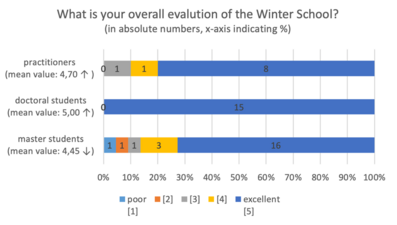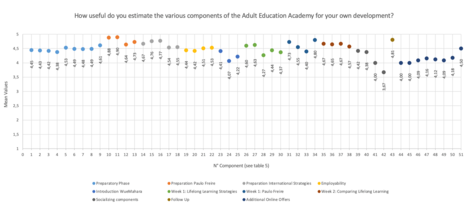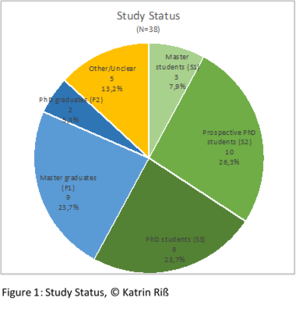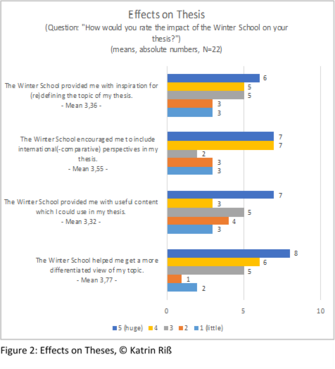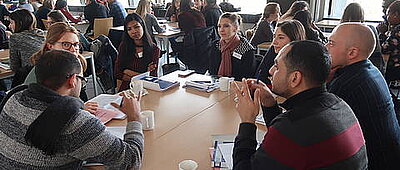Evaluation Results
Adult Education Academy Evaluation results (since 2022)
Evaluation result – Adult Education Academy 2025
Project-coordinator: Prof. Dr. Regina Egetenmeyer (Julius-Maximilian University Würzburg)
Evaluation: Professorship for Adult and Continuing Education, Adult Education Academy Team (Frank Schenk, Julia Saam)
Below you can find all of the important results of the Adult Education Academy 2025 in summary. Once again, the AEA was evaluated by using the same questions since 2016, to enable a good comparison between the years.
The evaluation includes an analysis of all participants, whereby a breakdown is sometimes made between the following three different subgroups: Master's students, doctoral students, and practitioners in the field of adult education and lifelong learning. The questionnaire combines dichotomous yes-no questions and rating scales from 1 to 5 (1 being the lowest and 5 the highest). In addition, open questions were used. In the following, the results of the group sample, the overall assessment as well as the effects and outcomes are presented.
Participants´ profile
As the first step, the evaluation examines the sample and shows the most important data. This gives an overview of the Adult Education Academy participants and some of their characteristics.
- In the AEA2025 60 of the participants were master’s students, which makes 59% of all the participants. A further 19 people (19%) were at the time of the Academy enrolled as doctoral students. 16 (16%) of the participants were practitioners from the field of adult education. The last 7 of the 102 participants, that voted in the evaluation of this year, were either staff at a university or moderators.
- From all 99 participants that gave information about their gender, 63% categorise themselves as female, while the other 37% as male. None of the participants identifies as diverse.
- On a scale from 1 (lowest) to 5 (highest), the participants indicated, that learning from lecturers from other countries was the most motivating category for participating in the Academy. This reached a mean of 4.66. The two closest other answers for this question were the motivation to meet students from other countries (mean 4,52) and to meet practitioners (mean 4,43). The lowest score and with this the lowest reason for attending the AEA25 was to improve one’s English language skills (mean 3,38) and the interest to travel to Germany (mean 3,44).
- Most participants became aware of the Academy by the recommendation of their professors (54%). The recommendation by former participants (49%) and learning about the Academy without actively looking for an international study mobility (45,3%), were the next reasons for attending. 7,4% of the participants already participated in the Academy before and took this as a reason to participate again. 14% learned about the Academy by flyers, advertisement or similar.
- The most support, that was given by the home universities to the participants was in the category of digital support with a mean of 4,25, on a scale from 1 to 5. This is closely followed by support during the application procedure (mean 4,18) and academic support (mean 4,17). The least category of support was financial support (mean 3,91) and individual coaching or consulting available upon request (mean 3,91).
- For 58,3% of the participants the Academy was the first study mobility. This number is even increased when only looking at the master’s students (68,3%). Doctoral students and practitioners on the other hand were more involved with study mobilities before the Academy, with both groups having around 37% first time mobilities. The mobilities, that were attended before were mostly conferences abroad including 20% of all the participants attending one before. Other international programmes similar to the Academy were participated by 13,7%. An exchange semester abroad was mentioned by 8,8% of the participants as well.
- When asked, how intensively the participants have dealt with the topics of the Academy before, a mean of 3,44 was reached. This does not change much, when looking at the individual groups, with the master’s students having a mean of 3,33, PHDs 3,53 and the practitioners having a mean of 3,93.
- The previous interest in the topics of the AEA shows much higher scores. Adult education and lifelong learning in general are fields of interests of 77,78% of all the participants. The interest in having a trans- or international focus in the future of professional activities follows closely after, with 73,15% of all participants indicating a previous interest. Focussing on trans-/international aspects in the future studies (69,44%) and the interest in trans-, international and comparative adult education (60,19%) are the other two categories mentioned, while still showing high scores of previous interests.
- While estimating their already existing competences in the categories, that are important during AEA, the most given answer was having competences in interacting with people from other cultural backgrounds (72,22%). English language competencies (68,52%) and the ability to see Adult Education and lifelong learning from another perspective (62,96%) were other competences, that participants estimate as already existing before the Academy. The least competence was seen in the understanding of ALE in other countries (41,67%) and in the methodological skills for conducting comparative research work (43,52%).
- The last category, when asking about the aspirations of the participants, was looking at their future study and career plans. 38% of all master’s students indicated, that they did not yet decide, in which field they would like to work in the future. 25% on the other hand indicated an interest in taking up a PHD or doctoral studies, while another 20% are equally interested in working in an academic research career and a career in practice. Working in both of those two fields (academic/research and a practice career) was the highest aspired future plan when looking at the doctoral students with 53%. Another 29% would like to work in an academic or research career in ALE. Practitioners were not asked to answer this question, since they are already working in the field.
Assessment of the programme
The overall evaluation of the programme was conducted on a 5-point scale (figure 1). Looking at the mean of all the participants the result was 4,49. The mean of the practitioners (4,54) and doctoral students (4,77) was higher than the total mean, while the one from the master’s students was slightly lower (4,42).
Fig. 1: Overall rating of the Adult Education Academy 2025
Next different parts of the programme are evaluated. This is conducted, while looking at the organizational, academic and didactical quality (figure 2). The Freire group and its topics reached the highest scores across all the categories, while the lowest scores are shared by the preparatory phase and the employment online sessions .
Fig. 2: Organisational, academic, didactical quality of the AEA 25 programme modules
Effects and outcomes of the Adult Education Academy
Additionally, the effects on the interest in the different topics of the AEA are presented in figure 3. While all means of this topic are above 4,0, the general interest in adult education increased the most, with a mean of 4,31. The lowest mean was reached by the motivation to focus on trans-/international aspects in further studies, with a mean of 4,09. This still shows a positive effect on the interest of the participants.
Fig. 3: Effects of the AEA 25 on the participants´ thematic interest
When asked about the motivation to undertake further study mobilities, the students (master’s and PHD/doctoral) indicated a mean of 4,32. None of the 72 students indicated a 1 (lowest). The motivation of the master’s students to take up a PHD has a mean of 3,58. Most of the doctoral students on the other hand seem eager to start postdoc research, after they graduated. This shows in a mean of 4,6, with 11 of the 15 votes showing the highest score.
The development of the participants skills during the Academy is shown in figure 4. Most of the categories have similar means however the improved understanding of ALE in other countries reached the highest score with a mean of 4,65, while improving the English language competencies reached the lowest mean of 3,85.
Fig. 4: Effects of the AEA 25 on the participants´ competences
Lastly, the personal, academic and (only for practitioners) employment outcomes of the participants are be presented. Those categories are differentiated between master’s students, doctoral students, and practitioners.
- The master’s students indicated similar outcomes on a personal (mean 4,19) and academic (mean 4,24) level. The fact, that only 3 master’s students indicated a two as the lowest score across both categories, shows a great impact for the participants.
- The doctoral students had even higher scores, with a mean of 4,94 on the personal outcome and a mean of 4,81 on the academic outcome.
- The practitioners find their result in the middle of the other two groups. Looking at the categories, the practitioners see a much greater impact on their personal outcome (mean 4,64), than on their academic outcome (mean 4,33). Additionally, the practitioners were asked about the outcome of the Academy for their employment. Here a mean of 4,36 was reached.
Hybrid setting
This year the Academy was executed in a hybrid setting. This means that both weeks were mostly held in a present setting, field visits were made in Würzburg, as well as outside of Würzburg (Frankfurt and Nürnberg). However, there was the opportunity to also attend online, as two comparative groups and one group during the first week, including online field visits, were designed for online and on campus participants. The hybrid setting gave people, which were not able to travel to Würzburg because of several different reasons, the opportunity to still attempt the programme fully.
Evaluation result – Adult Education Academy 2024
Project-coordinator: Prof. Dr. Regina Egetenmeyer (Julius-Maximilian University Würzburg)
Evaluation: Professorship for Adult and Continuing Education, Adult Education Academy Team (Frank Schenk, Julia Saam)
The most important results of the evaluation of the Adult Education Academy 2024 are summarised below. The 11th Adult Education Academy - AEA for short - took place in 2024. The AEA has been evaluated using the same set of questions since 2016, which allows for a good comparison between years.
The evaluation includes an analysis of all participants, whereby a breakdown is sometimes made between the following three different subgroups: Master's students, doctoral students, and practitioners in the field of adult education and lifelong learning. The questionnaire combines dichotomous yes-no questions and rating scales from 1 to 5 (1 being the lowest and 5 the highest). In addition, open questions were used. In the following, the results of the group sample, the overall assessment as well as the effects and outcomes will be presented.
Participants´ profile
At first, the evaluation looks upon some characteristics of the sample. The following information will provide an overview of some of the most important data of the group:
- That year 55% (44 people) of the participants are Master’s students. A further 22.5% (18 people) are enrolled as doctoral students at the time of the Academy. 12 (15%) of the participants are practitioners form the field of adult education. The last 7.5% (6 persons) are either staff at a university, moderators, or enrolled in another programme to participate in the AEA.
- The international nature of the Academy programme is repeatedly demonstrated by the wide repertoire of different countries in which students have graduated or will graduate. 8 of the 20 countries mentioned are European countries. The remaining countries are located on many different continents. The most represented country from another continent was India, from which 8 participants came that year.
- Of the 79 responses regarding their own gender, 62% (49 people) stated that they are female. The remaining 30 (38%) are male participants, while no one identified as divers.
- For the following question, participants are asked on a scale of 1 to 5 what motivated them most to attend the Academy. The top answer is learning from lecturers from different countries (mean 4.61), while meeting students from other countries is only just behind (mean 4.6). Improving one's own career prospects is the next following answer (mean 4.58). The ranking after these answers are "comparative studies" (mean 4.47) and "international and European strategies for lifelong learning" (mean 4.34). Meeting practitioners is of slightly less importance to the participants (mean 4.31). Improving English language skills (mean 3.78) and travelling to Germany (mean 3.74) has the lowest relevance for the participants.
- Most participants (67.5%) become aware of the Academy because of the recommendation by their professors. This especially applies for the master students (81.8%). The search for an international study mobility is another relevant category for the attendance of the Academy (44.6% of the participants). The lowest ranked reason for attending the Academy this year is that somebody attended the programme before (10.8%).
- On a scale from 1 to 5, the most kind of support from the home university is motivational support (e.g. encouraging to participate, supporting, self-confidence etc.) to attend the Academy (mean 4.42), while financial support (mean 3.05) is given less.
- For more than half of the students (57.8%) the Academy 2024 is the first study mobility. The most participants, that have already completed a study mobility, have spent a semester abroad (19.8%), which is particularly evident among Master's students (27.3% of all master students).
- The mean of all participants, about the question on how intensively they have dealt with the topics of the AEA before, is at 3.51. It must be highlighted that the Master's students have a mean of 3.07, while mean of the practitioners is much higher with 4.09. The doctoral students are between those two groups, but still above the total mean, with 3.88.
- The previous interest in the topics on the other hand is much higher, with 80.7% of all participants showing interest in adult education in general. The interest in trans- and international comparative adult education is noticeably lower, but still over half (57.8%) of the participants stated that they are interest in this topic.
- The level of competence in some categories before the Academy is also analysed. Here, the top competence of the participants seems to be English language (72.3%), while the interaction skills with people from other countries are about 10% lower (61.5%). This shows that the participants have confidence in their way of communicating with other students and lecturers. In terms of analytical and methodological skills for conducting research, they rate their own skills lower (analytical 56.6%, methodological 42.2%). The lowest value is found for the understanding of ALE in other countries (32.5%).
- The last category concerning the sample group asks about the career plans and aspirations. This of course does not concern the practitioners. 28% of the master students indicated their interest in the practice, but also an academic/research career in ALE. 25% of the Master’s students on the other hand only show interest in a career in the practice of ALE. While 23% did not yet decide, which career path they would like to go, other 22% are looking towards taking up PHD/doctoral studies. Only one of the Master’s students aims an academic/research career in ALE. Looking at the doctoral students, 57% focus a career in practice of ALE. Other 31% aim an academic/research career and a career in practice, while the remaining 2 persons would like something else, or have not yet decided.
Assessment of the programme
The overall evaluation of the programme was rated by the participants on a 5-point scale (figure 1). The mean of the practitioners is the highest with 4.8. The mean in total at 4.56 is slightly above the mean of the Master’s students with 4.43. The doctoral students are in the middle between the Master’s and practitioners with a mean of 4.65.
Fig. 1: Overall rating of the Adult Education Academy 2024
As a next part of the evaluation of the whole programme, the different modules of the Academy are evaluated upon their organizational, academic and didactical quality (figure 2). The best score got the Freirean studies in the 1st week (mean 4.6), while the preparatory phase got the lowest score (mean 4,24).
Fig. 2: Organisational, academic, didactical quality of the AEA 24 programme modules
Effects and outcomes of the Adult Education Academy
Effects on the interest in the topics are presented in figure 3. While the effect on the motivation to focus on trans-/international aspects in further studies is the lowest with a mean of 4.3, the interest in adult education and lifelong learning in general shows the greatest effect with a mean of 4.57.
Fig. 3: Effects of the AEA 24 on the participants´ thematic interest
When asked about the motivation to undertake further study mobilities after the Academy, all but one participant chose either a 4 or a 5, which lead to a mean of 4.63. While the interest of the Master’s students for taking up a PHD is relatively low with a mean of 3.56, the doctoral students show much more interest in postdoc research with a mean of 4.71.
Following now in figure 4, the improvement of the participants skills is shown. The improved understanding of ALE in other countries shows the highest results with a mean 4.66, which is closely followed by the change of perspective of ALE in the own country, which has a mean of 4.61. The lowest improvement can be seen in the English language competencies, which has a mean of 4.04.
Fig. 4: Effects of the AEA 24 on the participants´ competences
At last, the personal, academic and (only for practitioners) employment outcomes of the participants will be presented. Those categories will be differentiated between Master’s students, doctoral students, and practitioners.
- The personal (mean 4.37) and academic (mean 4.32) outcomes of the Master’s students show great similarities. As only one person of the Master’s students has given a differing answer which thereby lead to the difference between the two outcomes, it can be overall said that the Master’s students considered the Academy to be equally influential on both academic and personal improvement.
- The same can be seen for the doctoral students, where the personal (mean 4.53) and the academic (mean 4.59) outcome have similar means.
- Looking at the practitioners a slightly greater difference can be recognised between the academic (mean 4.56) and the personal (mean 4.78) outcomes. However, as the group of practitioners was with 9 people quite small, the bigger difference can again be traced back to one person choosing a lower ranking in academic outcomes than the others. Looking at the outcome for employment (mean 4.6), this result is close to the results of the other two categories.
Hybrid setting
This year the Academy was executed in a hybrid setting. This means that both weeks were mostly held in a present setting, field visits were made in Würzburg, as well as outside of Würzburg (Frankfurt and Nürnberg). However, there was the opportunity to also attend online, as two comparative groups and one group during the first week, including online field visits, were designed for online and on campus participants. The hybrid setting gave people, which were not able to travel to Würzburg because of several different reasons, the opportunity to still attempt the programme fully.
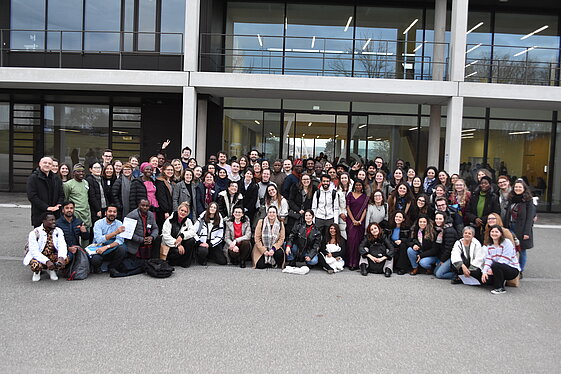
Evaluation result – Adult Education Academy 2023
Project-coordinator: Prof. Dr. Regina Egetenmeyer (Julius-Maximilian University Würzburg)
Evaluation: Professorship for Adult and Continuing Education, Adult Education Academy Team (Frank Schenk, Julia Saam)
A summary of the most important findings of the evaluation of the Adult Education Academy 2023 will be presented in the following. The 10th Adult Education Academy -short AEA- was held in 2023. Since 2016 the AEA is evaluated based on the same set of questions, which should lead to a good comparison between the years.
The evaluation will include a view on all participants, while sometimes a division is made, between the three different subgroups: master students, doctoral students and practitioners in the field of adult education and lifelong learning. The topics of the group sample, overall assessment, the effects and the outcomes will be looked upon.
The questionnaire combines dichotomous yes-no questions and rating scales from 1 to 5 (1 being the lowest and 5 the highest). In addition, open questions were used.
Participants´ profile
The first part of the evaluation concerns the characteristics of the sample. The following information provides an overview of the most important data of the group:
- 40,5% (30 persons) of the participants indicated, that they are master students. 27% (20 persons) are enrolled as doctoral students and 16,2% (12 persons) are practitioners in the field of adult education. The remaining 16,2% (12 persons) are either staff at a university, moderators, or were studying another study programme.
- The broad internationality of the Academy is shown by the countries, where students already achieved or will receive their degrees. This year 23 different countries were named, while 8 of the countries are European, the remaining 15 countries are from other continents.
- From everybody answering (N=69) the question of their gender, 78% (54 persons) stated they were female and 22% (15 persons) stated, they were male. No person indicated that they identified themselves as belonging to either one of the other (divers).
- On a scale from 1 to 5, the most frequently named motivational factor for attending the AEA is learning from lecturers from other countries (mean 4,67) and meeting students from other countries (mean 4,57). This is closely followed by the point of improving the own career perspectives (mean 4,4). The motivation for teaching content is not far behind, with “comparative studies” (mean 4,36) attracting greater interest than “European lifelong learning strategies” (mean 4,23). The lowest encouragement for the Academy is in travelling to Germany (mean 3,3) and improving English language skills (mean 3,2).
- Most participants (61%) received a recommendation from their professors to attend the academy. This is especially the case among master's students (83.3%), but also among doctoral students (70%). The lowest figures are found for advertising through flyers, newsletters, and similar advertising media (13.3%).
- The most support from students' home universities on a 5-point scale is for the application process (mean 4.17) and for individual help when needed (mean 4.16). Financial support seems to be the least (mean 3.15).
- For 56,1 % of all the participants the Academy 2023 was the first international study mobility. Looking at the master’s students in particular, the percentage is with 76,7% even higher. The students who have already participated in a study mobility mostly answered that they have participated in an international conference (16.4%).
- When asked, how intensively the students dealt with the topics of the AEA before, a mean of 3,49 was the result. There are no major differences between the different groups, with the highest score being among doctoral students (mean 3.68) and the lowest among practitioners (mean 3.25).
- The question about interest in the various topics shows differences. Adult education in general reveals high values for interest in the topic (84%). Lower values are found for the topic of trans/international and comparative adult education in particular (60%).
- A large proportion of participants estimate having already the competences to interact with people from other cultural backgrounds before the academy (72%). English language competencies were close behind (70.7%), as communication in English is a necessary component of the Academy. The lowest score was in understanding adult learning and education in other countries (30.7%), which leaves room for learning opportunities during AEA. Comparing the understanding of adult learning and education to methodological skills for conducting comparative research, there is a small increase by almost 7% to 37.3%.
- 20% (N=6) of the master students are planning to take up doctoral studies, while 33% (N=10) have not yet decided, what they plan to do in their near future. 30% (N=6) of the doctoral students want to work in an academic or research career exclusively, while 15% (N=3) want to work in a professional career. Almost half of the doctoral students (N=9) don’t want to stay in only one of the two fields and are planning to work in both.
Assessment of the programme
Looking at the overall evaluation of the AEA, a 5-point scale was used for assessment (figure 1). It can be seen that the mean value of the practitioners has a higher total with a mean of 4,7, than the master students with a mean of 4,3. The doctoral students are on the same range with a value of 4,53, compared to the total of all groups, which is 4,56.
Fig. 1: Overall rating of the Adult Education Academy 2023
Next, the evaluation asks the respondents about their specific evaluation of the organizational, academic and didactical quality of the programme modules (figure 2).
Fig. 2: Organisational, academic and didactical quality of the AEA 23’s programme modules
Effects and outcomes of the Adult Education Academy
Effects on the interest in the topics are presented in figure 3. All values have a mean of at least 4,3.
Fig. 3: Effects of the AEA 23 on the participants’ thematic interest
About 81% (N=39) scored either a 4 or a 5 when asked about their motivation for further study mobility, resulting in a mean score of 4.34.
Participants' further study plans were the next question asking masters and practitioners about their motivation for pursuing doctoral studies. Approximately 76.5% (N=26) checked either a 4 or a 5 when rating their motivation for doctoral study. Doctoral students were asked about their motivation for postdoctoral study, with 79% (N=15) ticking that they were highly motivated.
The impact on the improvement of participants' skills is presented in Figure 4. Improved understanding of ALE in other countries (mean 4.64 / N=67) and helping to see ALE from a different perspective in their own country (mean 4.46 / N=67), were highlighted. These two categories scored the highest.
Fig. 4: Effects of the AEA 23 on the participants’ competences
At last, the personal, academic and (only for practitioners) employment outcomes of the participants will be presented. Those categories will be differentiated between master’s students, doctoral students, and practitioners.
- Master’s students: The academic outcome shows a mean of 4,28 (N=29), while the personal outcome is a bit lower with a mean of 4,25 (N=28).
- Doctoral students: Compared to the master’s students, doctoral students show higher results in both categories. The higher results can be seen at the mean of 4,5 (N=18) in the academic and 4,56 (N=18) in the personal category.
- Practitioners: Just like the doctoral students, the practitioners show higher result, than the master’s students. Both, in the academic and personal outcomes a mean of 4,36 (N=11) can be observed. The outcomes for the employment of the practitioners are at a mean of 4,27 (N=11).
Hybrid setting
For the first time, the AEA was held in a hybrid setting. This means, that the participants were both, online and on-site. The first week was held fully online, while the second week was mostly on-site, with the possibility of a virtual participation, for those who were not able to or did not want to travel to Würzburg. The last two years were held online only due to the Covid pandemic, which led to the hybrid setting to ensure the ability to quickly switch to online only if necessary.
This change was also evident in the evaluation. Here, the most common recommendation or suggestion for improving the AEA was the topic of setting. 11 suggestions about the setting refer to the wish for a longer phase on site and at the same time a shorter online phase. Nevertheless, some students mentioned the importance of the hybrid setting and showed their support and suggestions for improvement of this form of learning.
For the next year, both weeks are planned to be on-site, while the possibility of an online participation will still be given.
Evaluation results - Adult Education Academy 2022
Project-coordinator: Prof. Dr. Regina Egetenmeyer (Julius-Maximilian University Würzburg)
Evaluation: Professorship for Adult and Continuing Education, Adult Education Academy Team (Marina Rößner, Julia Saam, Laura Leibinger)
This summary presents the most important findings of the Adult Education Academy 2022 evaluation. The Adult Education Academy – short: AEA – takes place since 2014. Since 2016, we conduct each year the same kind of evaluation with the same set of questions. This procedure should lead to a better comparison of the years.
In many categories, we observe the highest values in the year 2022. This indicates that the programme and its components get improved and adapted to the participants’ needs every year.
In the following, the results of the group sample, the overall assessment as well as the effects and outcomes will be presented. Since different groups participate in the AEA, the results will be also shown for different subgroups: the master students, doctoral students and practitioner in the field of adult education and lifelong learning.
Participants’ profile
The first questions refer to the characteristics of the sample. The following information gives an idea of the group:
- 55,8% (43 persons) of the participants indicate that they are master students while 31,2% (24 persons) are doctoral students and 13% (10 persons) are practitioners in the field of adult education. Only 6,5% (5 persons) indicate that they are staff at a university or that they were studying another study programme.
- Like in the years before, the participants show a broad internationality: they achieved or will achieve their degrees in 18 different countries, 9 from Europe and 9 from other continents.
- From 90 participants answering this questions, 66 (73%) are female, 24 (27%) are male and no respondent is diverse.
- Generally, participants apply for the AEA due to content-related, social and career-related reasons. This year, the social reasons – learning from lecturers from other countries (mean 4,81) and meeting students from other countries (mean 4,86) – have the highest values, compared with the lowest mean of 3,86 (Improving my English languages kills). (N=77)
- Most of the participants (82,6% / N=86) attend the AEA because their professors recommended it. This is especially for master (87% / N=46) and doctoral students (85,7% / N=28) the case. The lowest values can be found in the reason “I did not receive any recommendation from other persons, but learned about the AEA through flyers, advertisements newsletters or similar thing” with 4,7% in general and for example with 0% asking the practitioners (N=12).
- With a mean of 4,37 and 4,32 the motivational support (e.g. encouraging to participate, supporting, self-confidence etc.) and the support with the application procedure (e.g. reminding of deadlines, recommendation letters etc.) are the best rated kinds of support by the students’ home universities.
- For more than half of the students (57,7% / N=78) the Adult Education Academy is the first international study mobility. This is a high increase compared to last year’s result (49%), which might be traced back to the corona pandemic and restricted mobility possibilities throughout different countries.
- On a 5-point-scale, the mean value to the question “How intensively have you dealt with trans-/international topics on your previous studies or your work before the AEA?” is 3,41 (N=75). Obviously, the values differ among the subgroups: While master students indicate on average 3,21 (N=42), doctoral students (3,75 / N=24) and practitioners (3,67 / N=9) present higher values.
- The previous interest in the topics adult education and lifelong learning in general, trans-/international and comparative adult education and lifelong learning in particular, the motivation to focus on trans-/international aspects in further studies and the motivation to have a trans-/international focus in your future professional activities have all high agreement values. Especially the first item (adult education and lifelong learning in general) presents a high acceptance with 98,7% (N=75).
- Having a look at the previous competences of the participants, 78,3% (N=83) indicate that they had already high competencies in interacting with people from other cultural backgrounds before. In the categories “understanding of adult education and lifelong learning in other countries” (34,6% / N=81) and “methodological skills for conducting comparative research work” (37,8% / N=82), lower competencies can be identified.
- More than one third of the master students plan to take up doctoral studies in their future career (39% / N=38) and 29% plan to work in both fields (academic career and career in practice/policy field). Almost half of the doctoral students (48% / N=27) want to start an academic or research career in adult education and lifelong learning, compared to only 4% who want to work in the practice or policy field.
Assessment of the programme
As mentioned above, many results have their highest values in the Adult Education Academy 2022. This is also the case concerning the question “What is your overall evaluation of the AEA?” (see also figure 1). The mean value for all participants was 4,73 on a 5-point-scale which is a small increase to last year’s mean value (4,68). Having a deeper look at the subgroups, the group of master students (mean 4,74) and practitioners (4,88) improved their values as well (last year: 4,45 and 4,70). Only the doctoral students show a lower mean value with 4,67, compared to the result of 2021 (5,00).
Fig. 1: Overall rating of the Adult Education Academy 2022
For a more detailed picture the evaluation asked about the respondents’ opinion regarding the organizational, academical and didactical quality of the different programme modules (see figure 2).
Fig. 2: Organisational, academic and didactical quality of the AEA 22’s programme modules
Furthermore, the evaluation asked for the usefulness of the different programme components. Since there were many components, we would kindly ask you to write an email to lifelonglearning@uni-wuerzburg.de in case you are interested in special results regarding the programme components.
Effects and outcomes of the Adult Education Academy
At first, we would like to present the effects on the thematic interest (see figure 3). All values, except the ones of the doctoral students, turn out higher than in the last year. Having a look at the mean values of all participants, we can see that all the results range above the mean of 4,50. For further information, please have a look at the following table:
Fig. 3: Effects of the AEA 22 on the participants’ thematic interest
The effects on the motivation to undertake further study mobilities continue to be high. 89,7% (N=68) of the master and doctoral students ticked a 4 or 5 when being asked if they felt motivated to undertake further study mobilities abroad.
With regard to further study plans, 79,2% (N=48) of the master students and practitioners stated that the AEA increased their motivation to pick up doctoral studies (4 or 5 on the 5-point-scale). 88% (N=25) of the doctoral students agree that they would like to continue with a post-doc research after their graduation (4 or 5 on the 5-point-scale).
The last category are the effects on competences related to international study and work contexts in adult education and lifelong learning (see figure 4). Again, all ratings (regarding the total group) turn out higher than in 2021. Especially the improvement of the analytical competencies (mean 4,66 / N=83), the improvement of seeing adult education and lifelong learning in the own country from a different perspective (mean 4,75 / N=83) and the improvement of the understanding of adult education and lifelong learning in other countries (mean 4,67 / N=83) show the highest results.
Fig. 4: Effects of the AEA 22 on the participants’ competences
Finally, we would like to have a look at the personal, academic and (only for practitioners) employment outcomes, differed between master students, doctoral students and practitioners:
- Master students: the mean of the personal outcome on a 5-point-scale is 4,56 (N=41). Compared to the result of 2021 (4,08) we can again see an increase of the value. Also, the academic outcome increased from 4,16 in 2021 to 4,49 (N=41) in 2022.
- Doctoral students: In this category, the outcomes decreased slightly. The academic outcome in 2022 was 4,54 with N=28 (compared to 4,56 in 2021) while the personal outcome was 4,36 (compared to 4,73 in 2021).
- Practitioners: a mean value of 4,18 (N=12) in the academic outcome (2021: 4,42), 4,27 (N=11) in the personal outcome (2021: 4,42) and 4,43 (N=7) in the outcome for employment (2021: 4,58) can be identified.
Online setting and perspectives
For the second time, the AEA took place in a virtual mode which means that the participants could not travel to Würzburg. Due to the covid pandemic, it was not possible to plan the event on campus. Obviously, the participants missed the personal contact and exchange.
This can also be seen in the evaluation: With 17 mentions, the setting of the AEA in the question “Do you have any recommendations or suggestions to improve the Adult Education Academy” was the most mentioned category of the free text answers. Many of the students would prefer a face-to-face setting again, would like to meet physically and return to presence as soon as possible. The participants describe the online sessions as more tiring than meetings in person. Nevertheless, the overall rating of the AEA is still on a high level and the outcomes are rated well. In addition, the use of digital tools and the improvement of digital competences were mentioned many times in the section “Highlights of the AEA” and concerning the question “What have you learned academically or in a personal way during the AEA?”.
For the next year, the AEA will be planned in a hybrid mode: one week will take place online while the second week, the week of the intense comparative group work, will hopefully take place on campus at University Würzburg.
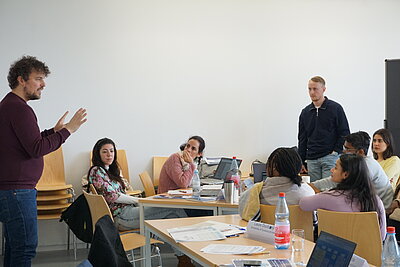
INTALL (2018-2021) evaluation
The results of the evaluation of the ERASMUS+ strategic partnership INTALL (2018-2021) will be published here.
Adult Education Academy Evaluation
Evaluation of the Adult Education Academy 2021
External Evaluation: Katrin Riß
INTALL-Project Coordinator: Prof. Dr. Regina Egetenmeyer (Julius-Maximilian University Würzburg)
This outline summarizes the main results of the short-term evaluation of the Adult Education Academy (AEA) 2021 – until 2020 referred to as the “INTALL Winter School”. The respective evaluation step was the fifth out of six within the programme ‘INTALL - International & Comparative Studies in Adult Education & Lifelong Learning’ (2018-2021). Further details are spelled out in the evaluation report.
Since the beginning of our external evaluation in 2019, we continuously see a very positive feedback by the participants and even a rising tendency in most of the findings. All in all, the programme seems to be well geared to its target groups and successfully reaches its goals in fostering interest, knowledge and competences in the field of adult education and lifelong learning. It catches one’s eye that other than in 2020, when master students tended to rate highest, in 2021 the doctoral students seemed to be most satisfied with the AEA. Practitioners obviously were only slightly less content with the programme. Master students close the list of subgroups, still being very pleased with the AEA.
Following we will pick out some findings to illustrate this overall picture. Also, we will summarize some results regarding the effects of the AEA.
The AEA 2021 – programme and evaluation
In 2021, the worldwide coronavirus pandemic took its toll on the AEA. Due to the binding contact and travel restrictions, the programme had to be transferred from a blended learning module to a fully virtual programme. All participants and all staff attended the AEA via their digital devices at home. All lectures and group work (including excursions and socializing events) were realized via video chatting services and further online collaboration tools. Nevertheless, the organizers succeeded to implement the agenda approved during the previous year without any major changes. Some modules were further optimized (following previous evaluation results). For example, the module “Employability in adult education” was expanded and transferred to the online preparation phase.
The external evaluation continued to work with the questionnaire developed by the organizers in previous years. In 2021, the analysis is based on a total of 61 cases.
Participants’ profile
Quite some questions of the short-term evaluation deal with the participants’ profile and their run-up to the AEA. The following findings intend to give an idea of the group.
- At the time of the AEA, 46% of the respondents (28 persons) were studying for a master’s degree, 29% (18 respondents) were doctoral students, and 23% (14 respondents) were practitioners (in the field of adult education and lifelong learning).
- Again, the AEA impressed with its broad internationality. According to the registration data participants of 21 different countries of origin joined the programme, studying in 15 different countries. These included the countries of the INTALL consortium as well as others, a fact that again reveals the internationality of students studying at the INTALL partner universities.
- In general, participants apply for the AEA due to content-related reasons, due to the wish to meet student/lecturers/practitioners from other countries and due to career-related motives equally. Besides, half of the doctoral students (50% / N=18) and around one third of the practitioners (31% / N=13) indicated to have registered in the AEA 2021 because they had attended it before (respectively the predecessor winter schools). This applies to none of the master students. Also, recommendations of former participants seem to be a strong inducement to participate. Among the master and doctoral students this applies for roughly half of the group (master students: 46% / N=26, doctoral students: 56% / N=18). Also, 30% of the practitioners agreed to that (N=13).
- 59% (26 respondents / N=44) (2020: 70% / N=56) of the master and doctoral students indicated that they had received some kind of support by their home universities. 95% of them agreed that this support had been helpful (4 or 5 on the 5-point-scale, mean value 4,77 / STD 0,528 / N=22).
- Almost half of the group had not undertaken any international study mobilities before attending the AEA (49% / N=61). 38% indicated they did so once. Obviously, these shares differ between the subgroups. While for 61% of the master students (N=28) the AEA was their first study mobility, this is true for 44% of the doctoral students (N=18) and for 36% of the practitioners (N=14).
- In 2021, the share of participants who had never or only little been in touch with trans- or international topics in their study or work before was bigger than in 2020. All the same, 70% (N=54) of the respondents agreed they already had been highly interested in trans-/international and comparative adult education/lifelong learning in particular before the AEA. Also, 73% (N=51) had been highly interested in focussing on trans-/international aspects in their further studies and even 81% (N=52) in their future professional activities.
- Further, 70% of the master students (N=23) and 75% of the practitioners (N=8) stated they were highly motivated to take up PhD studies before the AEA. 81% of the doctoral students (N=16) were highly motivated to take up postdoc studies after their graduation.
Assessment of the programme
As mentioned before, the overall assessment of the AEA in 2021 turned out exceptionally well. The mean value at the question “What is your overall evaluation of the AEA?” was 4,68 (STD 0,831 / N=47) (five-point-scale, 1=poor, 5=excellent). The subgroup of doctoral students even  rated with the highest possible rating at all (mean value 5,00 / STD 0 / N=15). This general picture is also confirmed by a set of questions asking how satisfied students were with the organizational, academical and didactical quality of the different programme modules. None of the modules achieved mean values lower than 4,20. Doctoral students were most satisfied.
rated with the highest possible rating at all (mean value 5,00 / STD 0 / N=15). This general picture is also confirmed by a set of questions asking how satisfied students were with the organizational, academical and didactical quality of the different programme modules. None of the modules achieved mean values lower than 4,20. Doctoral students were most satisfied.
In the evaluation participants were also consulted, how useful they considered the different components for their own development. Except for one component all mean values lie above 4,00 and mostly range around 4,50 on the five-point-scale. Compared to 2020, most of the results turned out higher.
Effects of the Adult Education Academy
The evaluation also keeps track of the effects and benefits of the AEA as assessed by its participants. In 2021, obviously the strongest effects were achieved with the group of doctoral students, followed by the practitioners and then the group of master students.
All results regarding the effects on the thematic interest in adult education and lifelong learning as well as its international aspects turned out higher than in the previous years. All mean values ranged between 4,31 and 4,56 (N=55) on the 5-point-scale (2020: 4,04 to 4,29, 2019: 4,16 to 4,31). The effects on the motivation to undertake further study mobilities continued to be high. 90% (N=41) of the master and doctoral students ticked a 4 or 5 at the respective question. With regard to further study plans 63% of the master students and practitioners (N=32) stated that the AEA had increased their motivation to pick up doctoral studies (4 or 5 on the 5-point-scale). 87% of the doctoral students (N=15) confirmed this effect with regard to a possible post-doc research after their graduation (4 or 5 on the 5-point-scale).
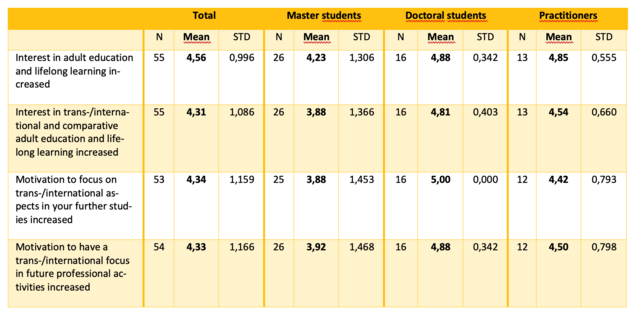
Effects on the interest in adult education and lifelong learning
Further, the findings on the effects on competences related to international study and work contexts in adult education and lifelong learning resulted very high and exceeded the values of the previous year. Again, the ratings of the doctoral students turned out to be the highest among the subgroups (mean values between 4,31 to 4,75 with a relatively low spread of data points). Little lower we find the results of master students (mean values from 3,54 to 4,27).
|
| Total |
| Master students |
| Doctoral Students |
| Practitioners | ||||
| N | Mean | STD | N | Mean | STD | N | Mean | STD | N | Mean | STD |
understanding of AE and LLL in other countries improved | 54 | 4,52 | 1,041 | 26 | 4,27 | 1,343 | 16 | 4,75 | 0,577 | 12 | 4,75 | 0,622 |
helped me to see AE and LLL in my own country from a different perspective | 53 | 4,42 | 1,082 | 24 | 4,21 | 1,414 | 16 | 4,75 | 0,447 | 13 | 4,38 | 0,870 |
methodological skills for conducting comparative research work improved | 54 | 4,26 | 1,013 | 25 | 4,08 | 1,320 | 16 | 4,56 | 0,512 | 13 | 3,85 | 0,725 |
analytical competencies improved | 54 | 4,00 | 1,229 | 25 | 3,88 | 1,453 | 16 | 4,31 | 0,704 | 13 | 3,85 | 1,281 |
professional networking competencies improved | 53 | 4,13 | 1,144 | 24 | 3,92 | 1,283 | 16 | 4,56 | 0,727 | 13 | 4,00 | 1,225 |
competencies in interacting with people from other cultural backgrounds improved | 54 | 4,30 | 1,039 | 25 | 4,08 | 1,222 | 16 | 4,75 | 0,447 | 13 | 4,15 | 1,068 |
Effects - Competences (by subgroups)
Perspectives
All in all the findings drew a very positive picture of the AEA, and it seems that the organizers successfully transferred the programme into an online concept.
In 2021 the AEA’s funding within the project ‘INTALL - International & Comparative Studies in Adult Education & Lifelong Learning’ will come to an end. Also, considering the current pandemic situation, it continues to be uncertain if the AEA – in case of further funding – will return to the face-to-face event in Wuerzburg next year. Nevertheless, before closing this report, we would like to highlight some final aspects worth mentioning or worth considering for future programmes. (1) As in the reports 2019 and 2020, at this point we will pick out the employability module. This module underwent several changes over the last years. In 2021 now, it was extended, split up in several sessions and shifted to the preparation phase. Along with these changes the participants feedback has improved since 2019 remarkably. The results in this year’s evaluation finally are on par with those of the other modules. All subgroups seem to have benefitted more than in the years before. (2) In the past evaluations, respondents often highlighted the connecting and networking effect of the Winter School/AEA. At this of course the informal parts of the programme and the socializing components did their bit, however were hard to compensate within the virtual setting. Nevertheless, the results show that the AEA obviously succeeded in its goal to foster networking among its participants. (3) On the other hand, the virtual setting also implied a number of learning opportunities. Various comments positively referred to the variety of online applications for digital teaching and learning introduced by the AEA. However, some participants also felt that this variety was too vast. (4) Some comments finally suggested to further exploit the chances of the online modus. For example, field visits to practice institutions could be extended to institutions in other countries than just Germany.
Evaluation of the Winter School 2020
Summary of the external evaluation results
Author: Katrin Riß
INTALL-Project Coordinator: Julius-Maximilian University Würzburg, Prof. Dr. Regina Egetenmeyer
The Winter School Programme 2020
In February 2020, the INTALL-Winter School was held for the second time. Compared to the previous year, three main modification were applied, which again proves the programme’s adaptability and the organizers’ constant effort to improve the Winter School according to evaluation results and observations made. First, the heterogeneous interests and needs of the target group of practitioners were taken more into account. By opening both Winter School weeks to the group of practitioners, more options were given especially to those who were interested most in dealing with theoretical approaches of adult education and lifelong learning (week 1). Second, in 2020 the organizers provided a more differentiated and extended programme regarding the topic of employability, a component that stuck out in the 2019 evaluation. And third, responding to the considerable popularity of the Winter School, the organizers increased the number of participants to a total of 83 (during week 2) compared to a total of 67 in 2019.
Approach, data basis and perspectives of the external evaluation
Some alterations aside, the short-term survey 2020 continued to take a quantitative approach. The survey was based on the very questionnaire used in the evaluation cycle 2019, implemented as an online survey at the end of the Winter School. In total, 70 questionnaires were filled in, which sum up to a response rate of 84%. To give a more detailed picture, in 2020 the study often differentiates between the subgroups of the survey’s population, i.e. the master students, the doctoral students and the practitioners.
Sample/group characteristics
The group of participants was again particularly characterized by its great internationality. The number of countries of the students’ home universities or employers totaled to 16 in 2020, a little more than half of them were European countries (56%). Further the participants backgrounds included 33 different countries of origin and 26 different countries of present residence. This range again far exceeded the consortium of the ten INTALL partners and reflects the considerable internationality of the INTALL partners as well as the remarkable outreach of the programme.
In 2020, a little less than half of the respondents were studying for a master’s degree at the time of the Winter School (31 respondents, 44%). Around one third were PhD students (25 respondents, 36%) and 1 out of 5 belonged to the group of practitioners working in the field of adult education and lifelong learning (20%).
Regarding the gender distribution, 71,4% of the group were female, 28,6% male.
Participants’ Satisfaction
The international Winter School in Wuerzburg has received remarkably good evaluation results during the last years. The Winter School in 2020 is no exception to this. In an overall perspective, the participants rated the Winter School programme with a mean value of 4,33 (SD 0,675) on the 5-point-scale and thus nearly as high as in 2019 (4,39). While the practitioners stayed very steady in their assessment (from 4,11 in 2019 to 4,14 in 2020), the doctoral students rated a little lower (from 4,47 in 2019 to 4,04 in 2020) and the master students a little higher (from 4,42 in 2019 to 4,65 in 2020).
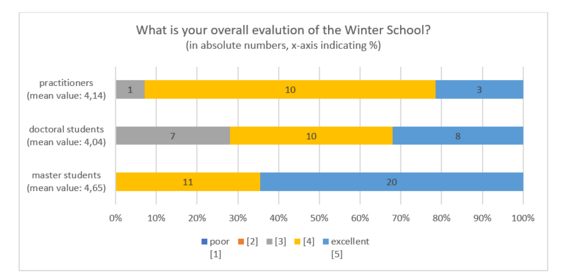
With regard to the organisational, academical and didactical quality of the different programme modules, the results turned out to be rather high. The respective mean values ranged between 3,70 and 4,56. Strongest modules seemed to be the Preparatory Phase and “Lifelong Learning Strategies in Europe/ International Strategies in Adult Education”. At this point we see a rising tendency since 2019. 10 out of 15 mean values (5-point-scale) turned out to be higher than in the previous Winter School.
Also, the participants were asked how useful they considered the different programme components for their own development (rating on a 5-point scale with 1 = not useful and 5 = very useful). Almost all mean values of the components turned out to be higher than the value of 4,00. 23 out 35 items were rated higher than in the 2019.
Effects of the Winter School
The results of the short-term-survey in 2020 equal those of 2019 remarkably. Again, the Winter School had strengthened the participants’ interest in adult education and lifelong learning considerably and also increased their interest and motivation to focus on its trans-/international and comparative aspects in their further studies or future professional activities. All items asked for in the questionnaire received very high mean values between 4,04 and 4,29 on the 5-point scale (1=not at all, 5=very much). Taking a closer look at the subgroups the survey shows that doctoral students tended to rate these questions a little lower.
| Total | Masters students | Doctoral students | Practitioners | ||||
| N=70 | N=31 | N=25 | N=14 | ||||
| Mean | STD | Mean | STD | Mean | STD | Mean | STD |
Interest in adult education and lifelong learning increased
| 4,29 | 0,887 | 4,45 | 0,624 | 4,04 | 0,978 | 4,36 | 1,151 |
Interest in trans-/international and comparative adult education and lifelong learning increased
| 4,12 | 1,022 | 4,33 | 0,802 | 3,72 | 1,308 | 4,36 | 0,633 |
Motivation to focus on trans-/international aspects in your further studies
| 4,06 | 1,006 | 4,33 | 0,661 | 3,80 | 1,190 | 3,91 | 1,221 |
Motivation to have a trans-/international focus in future professional activities increased
| 4,14 | 1,004 | 4,32 | 1,013 | 4,00 | 0,978 | 4,00 | 1,038 |
Also, participating in the programme seemed to increase the respondent’s motivation to undertake further study mobilities considerably. 84% of the master and doctoral students (N=56) scored a 4 or 5 at this question. The respective mean value was 4,32 (STD 1,011).
Further, 66% of the master students and practitioners (N=45) ticked a 4 or 5 when being asked if their motivation to take up PhD studies had grown (2019: 56%). 64% of the doctoral students (N=25) chose a 4 or 5 to indicate that their interest in taking up postdoc research after graduation had increased due to the participation in the Winter School.
And finally, the Winter School also intends to have an effect on competencies related to international or internationally influenced working contexts. In 2020 again, a large share of respondents clearly agreed on these effects. First, the Winter School obviously has a large impact on the development of intercultural competencies. 82% of the participants indicated that the Winter School had helped to improve their “competencies in interacting with people from other cultural backgrounds” considerably by rating a 4 or 5 (mean value 4,21 / STD 1,001). Also, 87% of the respondents stated that their “understanding of adult education and lifelong learning in other countries” had improved by ticking a 4 or 5 (mean value 4,37 / STD 0,745). 74% scored a 4 or 5 when being asked in how far the Winter School had helped to “develop different perspectives on adult education and lifelong learning in their own country” (mean value 4,06 / STD 1,048).
Regarding methodological skills, analytical competencies and professional network competencies the results turn out to be a bit lower. The mean values at the respective items are 3,81 (STD 1,115), 3,78 (STD 1,104) and 3,76 (STD 1,173). The results of the different subgroups at these effects differ considerably. Except for a better understanding of adult education and lifelong learning in general, master students seem to profit most regarding the development of their competencies.
| Total | Master students | Doctoral Students | Practitioners | ||||
N | 70 | 31 | 25 | 14 | ||||
| Mean | STD | Mean | STD | Mean | STD | Mean | STD |
understanding of AE and LLL in other countries improved
| 4,37 | 0,745 | 4,48 | 0,724 | 4,16 | 0,850 | 4,50 | 0,519 |
helped me to see AE and LLL in my own country from a different perspective
| 4,06 | 1,048 | 4,45 | 0,675 | 3,76 | 1,200 | 3,71 | 1,204 |
methodological skills for conducting comparative research work improved
| 3,81 | 1,115 | 4,23 | 0,805 | 3,44 | 1,294 | 3,54 | 1,127 |
analytical competencies improved | 3,78 | 1,104 | 4,37 | 0,556 | 3,16 | 1,214 | 3,62 | 1,193 |
professional networking competencies improved | 3,76 | 1,173 | 4,16 | 0,860 | 3,32 | 1,376 | 3,67 | 1,155 |
competencies in interacting with people from other cultural backgrounds improved | 4,21 | 1,001 | 4,42 | 0,720 | 3,96 | 1,241 | 4,17 | 1,030 |
Table 1: Effects - Competencies (by subgroups)
Conclusions
The short-term evaluation of the INTALL-Winter School 2020 again shows that the programme is highly appreciated by its participants and the effects must be considered as high. In an overall perspective the results equal those of the previous year(s) and continue to be on a very high level. Again, the evaluation shows that especially the welcoming, respectful and encouraging learning atmosphere is of great value to the participants. Particularly good and noticeably higher ratings compared to 2019 were given to the module “Lifelong Learning Strategies in Europe/ International Strategies in Adult Education” which is realized during week 1 of the Winter School.
In an overall perspective, it seems that the master students are most satisfied with the Winter School experience. Looking at their motivation we saw that they started with the broadest interest in all aspects and learning opportunities of the programme and also have profited in a very broad and multiple sense. Doctoral students obviously seemed to be focused especially on the content level of the Winter School and in general gave lower ratings than the masters (and mostly practitioners) did. Practitioners finally entered the programme mostly for reasons of exchanging with other experts/fellows in the field as well as looking for expertise in a theoretical but also practical sense, and in the end seem to be fairly satisfied with the Winter School.
The evaluation 2020 produced the following conclusions for further improvement, which however only concern smaller aspects and do not show a need for greater modifications: (1) Since 2019, considerably chances have applied with regard to the practitioners and obviously already have led to various effects. The practitioners’ role seems to be clearer, the integration in the group obviously was improved and all in all we find the practitioners’ satisfaction with the programme to be quite high. Nevertheless, some (single) findings suggest that in week 2 the role of practitioners during the comparative groups could be further developed. (2) The Employability Day has been changed since 2019 considerably and in 2020 the respective evaluation results have improved. Nevertheless, this module seems to bear further developmental potential compared to the other parts of the programme. Unfortunately, the findings give no further hints in which way this component should be altered.
External Evaluation of INTALL
The Winter Schools 2019, 2020 and 2021 within the newly launched project INTALL will be accompanied and monitored by an external evaluation conducted by Katrin Riß (Cologne). This evaluation combines assumptive and formative aspects. It will give evidence of the programme’s outcomes and it seeks to support the programme’s effectiveness by providing relevant information on modifications required throughout the three years’ process. In order to ensure a long-term perspective on the Winter Schools in Wuerzburg since their beginning in 2016, the evaluation builds on the COMPALL evaluation conducted by Susanne Lattke of the German Institute for Adult Education in Bonn. Again, it involves a short-term perspective and a mid-term perspective on the programme covering the following objectives.
The short-term evaluation: This part of the evaluation mainly focusses on the students’ assessment of the programme: First, it will cast a light on the participants’ motivation for attending the Winter School, ask about the support provided by the students’ home universities to enable and back their participation and give some information about their content-related knowledge and competencies before the Winter School. Second, it will outline how participants assess the quality of the different programme modules as well as how relevant they consider the different components for their own development. And third, the evaluation addresses the effects of the Winter School. This concerns effects on the students’ competence development and their interest in adult education and lifelong learning (especially regarding the international focus), study prospects, professional career prospects, and study mobility.
The mid-term evaluation: This part of the evaluation lays emphasis mainly on the effects of the Winter School programme. It asks how the international focus in the participants’ studies and professional practice develops over the course of the programme. Also, it will address the question to what extent the participation has influenced the students’ further study aspirations (taking up a PhD or post-doc research) as well as the motivation to undertake further study mobilities. And finally, the mid-term evaluation deals with the competences gained or enhanced by attending the Winter School.
In order to produce relevant information to these questions, six surveys will be conducted addressing the participants or former participants of the Winter Schools. At the end of each Winter School (February 2019, 2020, and 2021) three mainly quantitative surveys will compile information regarding the participants’ immediate assessment of the joint module (short-term). Three surveys about 15 months after each Winter School will keep track later on (mid-term).
Evaluation of the Winter School 2019
Summary of the external evaluation results
Author: Katrin Riß
INTALL-Project Coordinator: Julius-Maximilian University Würzburg, Prof. Dr. Regina Egetenmeyer
Approach
The short-term evaluation in 2019 took a mainly quantitative approach. The questionnaire used was based on the instrument applied in the years before and adjusted to the current Winter School by the organisers. The findings result from a total of 67 questionnaires (response rate 100%), filled in online at the end of the Winter School.
Sample/group characteristics
The group of participants was formed by students from 20 different countries, about two third of them being master students (43 persons, 64%), 1 out of 4 being a doctoral student (15 persons, 22%), and about 1 out of 7 working as practitioners in the field of adult education and lifelong learning (9 persons, 14%).
Participants’ Satisfaction
The evaluation clearly shows that, all things considered, the participants were highly satisfied with the Winter School. On a 5-point scale (1 = poor, 5 = excellent) their overall assessment reached a mean value of 4,39. These very high ratings confirm the results of the COMPALL evaluations in the years 2016 to 2018 assessed with similar mean values (2016: 4,20, 2017:4,24). Taking a closer look, we also see that no outliers at all can be found in that question and the high ratings apply to all student groups (master students, doctoral students, practitioners) with the ratings of the practitioners being the lowest.
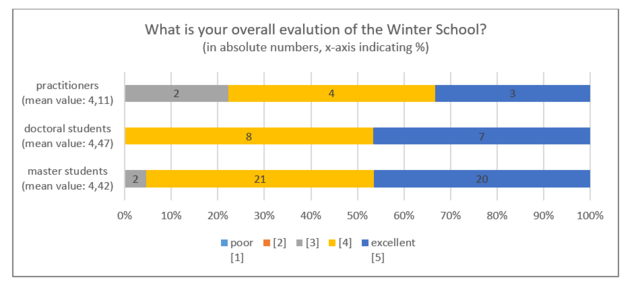
With respect to the different programme components, especially Week 1 and the Comparative Groups during Week 2 achieved very high ratings in the categories organisational, academic, didactical quality (all means values ranging between 4,13 and 4,40 on a 5-point scale with 1 = not satisfied, 5 = very satisfied). Ratings a little lower were given to the Preparatory Phase (mean values for the three categories 4,04 – 3,93 – 3,99) varying from country to country. The lowest ratings finally were registered with regard to the Employability Day at the beginning of Week 2 (mean values 3,72 – 3,67 – 3,79).
According to this data but also to the participants’ qualitative feedback the Winter School appears to be a learning setting well accepted and appreciated by the students. Various comments highlighted the didactical quality of the sessions, a learner centric and participative approach including a broad variety of (innovative) teaching methods, as well as respectful, unformal and supportive atmosphere at the Winter School.
Effects of the Winter School
The International Winter School mainly intends to introduce its participants to international issues and comparative aspects within adult education and lifelong learning and to provide them with the respective competencies and skills required in international or internationally influenced working contexts. Based on the participants’ answers it can be concluded that the Winter School widely accomplishes these goals. The majority of the students strongly agrees that their interest in trans-/international and comparative aspects of adult education and lifelong learning has increased and that they are motivated to further focus on these aspects in their studies and even in their future professional activities (see table). Concerning the question if their motivation to undertake further study mobility increased, more than 90% of the master and doctoral students (N=58) scored a 4 or 5 on the 5-point scale. Also, the motivation to take up further studies was increased: 56% of the master students and practitioners rated a 4 or 5 on the scale expressing their motivation to take up a PhD. 62% of the doctoral students (9 persons) stated with a score of 4 or 5 that their interest in taking up postdoc research after their graduation increased due to the participation in the Winter School.
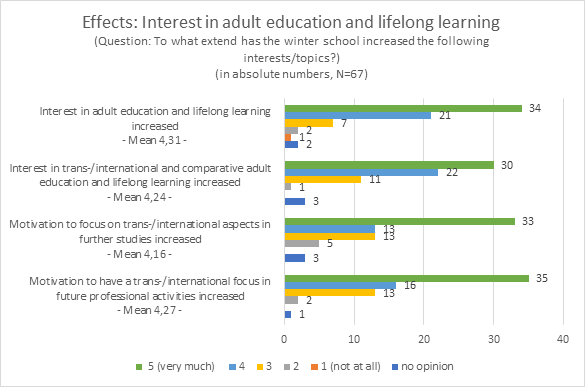
With regard to the effects of the Winter School, the questionnaire also asked about the development of competencies induced by participating in the programme. As the chart below illustrates all ratings are considerably high, especially concerning aspects that refer to “international” competencies and knowledge. For example, almost all participants (93%) claimed that their understanding of adult education and lifelong learning in other countries has increased very much or much. 78% of the group have ticked a 4 or 5 when being asked if their intercultural competencies have improved. The lowest values – even if still high – on the other hand we find for the question concerning the increase of analytical competencies. At this point, it has to be kept in mind that 2/3 of the participants had stated that these competencies had been high already before the Winter School.
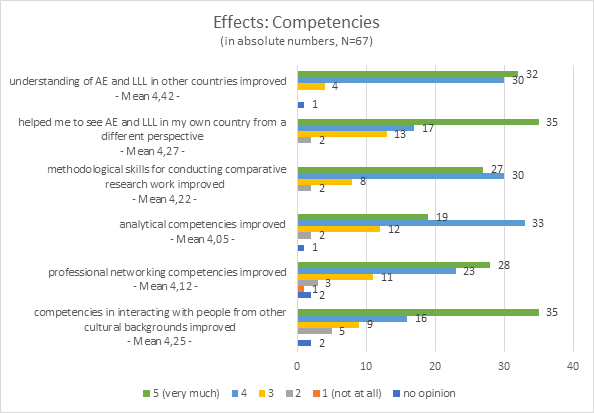
When taking a closer look at the outcomes for the different groups of participants, we see that master and doctoral student obviously profited the most from participating in the Winter School. This regards the academic outcomes (mean value 4,38 on the 5-point scale) as well as the personal ones (mean value 4,43). For the group of practitioners, who were newly addressed by the INTALL Winter School the outcome, however, resulted a little lower. This group rated their academic outcome with a mean value of 3,56 (on the same 5-point scale), the personal outcome with 4,0, and finally the outcome for the employment with a mean value of 3,88.
Conclusions
The evaluation’s findings confirm and continue the consistent positive or more precisely rising results of the COMPALL evaluation and attest the Winter School to be a well-designed and effective learning opportunity for its participants. The results prove a respectful learning environment that obviously encourages its participants to develop confident research activities and improves employability skills. Apart from social and especially intercultural outcomes the evaluations points to considerable academic learning effects for the participants. This regards knowledge about international contexts of adult education and lifelong learning as well as the improvement of academic skills – most striking of course comparative skills.
Despite this already high standard, the evaluation’s results point to some modifications on the concept and programme. This concerns the following aspects: (1) Some findings suggest that the concept regarding the new target group of practitioners can be further adapted in order to increase the effects and to fully exploit the chances arising from bringing students and practitioners together. Obviously, the role of the practitioners was not very clear to the group at every point of the Winter School and chances to contribute their specific perspective on the subjects discussed should be inhanced. Also, it seems that the preparation of the practitioners should receive more attention. (2) Other findings indicate that the concept of the Employability Day needs to be revised. Obviously, this module did not fully match the participants’ needs and some of them were hoping for more profound information. At this point, some more thought might be given to the variety of participants and strategies should be found to take the differing prior knowledge more into account (splitting the group, using methods that allow more options and flexibility, using the expertise of the practitioners etc.). (3) This piece of work obviously plays an important part during the preparatory phase of the Winter School and contributes remarkably to the learning effects of this programme. In this process it requires considerable effort and time to prepare and thus seems to be highly important to the participants. At some points the findings of the evaluation suggest that during the intensive phase some more time and focus should be spent on these essays in order to provide more content-related feedback as well as appreciation for the effort taken. Considering the little data base this fact might only regard single comparative groups. In any case, we recommend ensuring the same intensity in dealing with the transnational essays in all comparative groups. (4) As in the years of the COMPALL Winter School, the programme schedule remains a quite striking aspects in the evaluation. Various comments suggest that especially during Week 1 efforts should be taken to keep participants attentiveness high. This might include changes in the schedule like shifting intense lectures to an earlier day time, but also using (even) more interactive teaching methods and providing more opportunities for interaction among the group.
Mid-term evaluation
The external evaluation surveyed the mid-term effects of the Adult Education Academy (AEA) from 2019 to 2021. Over the past three years, 158 former participants of the programme answered to the organizers’ questions (2019: N=71; 2020: N=49; 2021: N=38), some of them repeatedly. All in all, the surveys’ samples mostly represented the AEA’s population quite well, for example when it comes to the international composition of the AEA groups but also in terms of study status.
When reading and interpreting the surveys’ results, one should keep two aspects in mind. First, the surveys are based exclusively on the assessment of the respondents. Secondly, the data probably contains a certain bias. Is to be assumed that mainly those participants have joined the survey who regarded the AEA as a valuable experience – a fact however that probably concerns all mid- and long-term surveys on events or trainings.
However, on the scale of things, the AEA should be considered as a learning platform well remembered and well appreciated by its participants. The strikingly high results on the overall assessment confirmed this result year by year. Comments in the free-text answers support this view, characterizing the AEA as an enriching learning opportunity, or – choosing the words of one of the participants of the survey in 2021 – a “creative and innovative programme of adult learning”.
The AEA’s mainly aims to encourage and enable students and practitioners of adult education and lifelong learning to deal with international aspects in their studies and their professional life. The results of the mid-term evaluation prove a development on the professional as well as on the personal level. Various statements over the years illustrate, that participants felt enriched and inspired in this sense. Regarding the effects the mid-term questionnaire particularly asks for the following aspects: effects on the study career, effects on choosing international aspects in theses, effects on work contexts, effects on competences (such as analytical, methodological, intercultural, networking competences etc.) and effects on the participants’ networking.
When describing the participants’ study or work situations at the times of the surveys we already see a considerable international focus. More than 60% of the master students and more than 70% (up to more than 90%) of the students were dealing with international aspects in their theses. Looking at their current work contexts, around two-third dealt with international dimensions (at this point however the number of cases was rather small in all midterm surveys). When explicitly asking for effects of the AEA on their study and work careers, roughly 80 to 90% of the respondents stated the AEA had a strengthening effect on their study career, i.e., regarding the motivation to take up a PhD. In 2021, the results in this regard turned out lower, however due to the low number of valid cases this finding is difficult to read. Around 55% saw an effect on their theses (master or PhD). More than 80% over the years indicated that the AEA had strengthened their motivation to find an employment in international working environments.
The results on the effects on professional competences are very clear. During the past three years, very high results have been achieved at every dimension suggested (i.e. intercultural, analytical, methodological etc.) (mean values on the 5-point-scale roughly between 3,9 and 4,6). And finally, the networking effects seem to be considerable, however at this the participants have given a feedback a bit more moderate.
Considering these results, the AEA obviously succeeds in its goal to set impulses that motivate students to further deal with international aspects in their career and to enhance their capacity to deal with such aspects. Thus, it can be seen as a valuable learning opportunity within the field of adult education and lifelong learning for master students, PhD students and practitioners in the field.
Mid-term Evaluation 2021 - Summary
Author: Katrin Riß
INTALL-Project Coordinator: Julius-Maximilian University Würzburg, Prof. Dr. Regina Egetenmeyer
Approach and data bases
The mid-term survey 2021 was the final step of the external evaluation of the INTALL Adult Education Academy (formerly INTALL Winter School). Based on the concept of the previous years it addressed former participants of the years 2016 to 2020. In 2021, the number of cases was relatively low (N=38) and comprised 15% of the participants addressed, 11% of all former participants. Most of the data of the survey reflect the participants’ perspective one to three years after the participation in the AEA. 39% (N=32) of the data refer to a participation in the previous programme cycle (2020). 21% refer to a participation in 2019 and further 24% reflect the perspective after three years.
Sample/Group characteristics
Again, the survey succeeded in capturing the broad spectrum of countries the AEA’s participants are related to. In the years 2019 to 2021 the programme had gathered participants from 15 to 20 different countries each year. The mid-term survey 2021 includes 15 different countries where the participants had received or will receive their master or PhD degree. 54% (N=35) of the master’s degrees and 59% (N=17) of the PhD degrees were or will be received at European universities (Germany, Italy, Hungary, Portugal, Norway). Non-European countries represented in the survey are Brazil, Georgia, Ghana, India, Nigeria, Palestine, South Africa, Ukraine, and the USA.
58% (22 persons) of the respondents were still studying when participating in the survey. The exact same share (58% / 22 persons) indicated they were currently employed or had been employed since their participation at the AEA. 10 out of theses 22 were working in the practice or policy field of adult education and lifelong learning, 7 were in the research or academia of adult education and lifelong learning.
Results
The results of the survey 2021 perfectly fit in the picture drawn by the mid-term surveys in 2019 and 2020 and confirm and consolidate the overall picture before.
- Regarding the effects on the participants’ further studies the data in 2021 was rather scarce. Nevertheless, 14 out of 24 persons (58%) indicated that the AEA had rather large effects on their master or PhD theses (ratings 4 and 5 on the 5-point-scale), a figure that matches the results of the previous year (55%). The mean value is 3,46 (STD 1,215). 64% (ratings 4 or 5, N=22) confirmed they got a more differentiated view on their topic while the same share (64%, N=22) stated that the AEA had encouraged them to include international (-comparative) perspectives in their theses.
- Looking at future work contexts, 81% (N=26) of the respondents clearly confirmed a motivating effect to work on international issues (ratings 4 and 5). 58% stated that the AEA had provided them with helpful information and contacts for finding future work. Also, 46% chose a 4 or 5 when asked to what extent the AEA gives them a competitive advantage on the labour market.
- The results concerning the AEA’s effects on the respondents’ competences turned out very clear and confirm the results of 2020. All competences asked for were rated with mean values between 4,19 and 4,59 (N=32). The highest effects obviously are achieved regarding competences in interacting with people from other cultural backgrounds. Here, 94% ticked a 4 or 5 on the 5-point scale. Further, a vast majority highly confirmed effects on their understanding of adult education and lifelong learning in other countries (88% ratings 4 or 5). Networking competences were rated a little higher than in 2020. The mean value rose from 3,98 to 4,28 and thus approached the other competences’ high level.
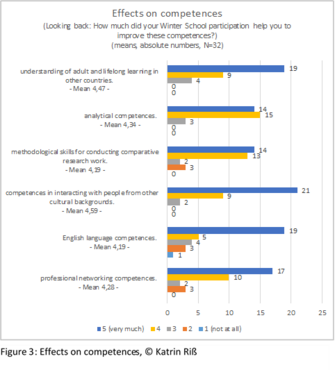
- The survey finally intended to learn about the effects on the respondents’ networking. Obviously, the AEA creates a network the participants feel they can rely on. 78% (N=32) confirmed that fact by ticking a 4 or 5 on the 5-point-scale. This obviously not only concerns a professional level. More than half of the group confirmed they had made “really good friends” at the AEA (56% ratings 4 or 5). Regarding a deeper networking process, the opinions differ. Little more than half of the group agreed that they have started a very close exchange or cooperation with some participants (53 ratings 4 or 5).
Mid-term Evaluation 2020 - Summary
Author: Katrin Riß
INTALL-Project Coordinator: Julius-Maximilian University Würzburg, Prof. Dr. Regina Egetenmeyer
Approach
The mid-term survey 2020 again was based on the evaluation concept of the previous years. It follows a mainly quantitative approach realised as an online questionnaire. The call for participation again reached out for all former participants of the Winter School years from 2015 to 2019. In 2020, 49 persons fully completed the questionnaire, around 70% of the sample size of 2019 (71 cases). For the first time the sample also included practitioners, a subgroup that the Winter School was opened for in 2019.
Sample/Group characteristics
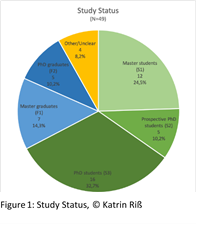
The survey successfully addressed the large international spectrum of Winter School participants, which of course is to be considered as one of the outstanding features of the programme. The number of countries where the respondents had or will earn their degrees (master, PhD and both) amounted to a total of 15. 72,7% of the master’s degree and 56,5% of the PhD degrees were earned at European universities. The list of European countries included Germany, Greece, Hungary, Italy, Norway, Portugal, Romania, Serbia, Slovenia and Spain. Further, participants from India, Malaysia, Morocco, Nigeria and the USA have answered to the organisers request.
At the time of the survey, approximately two out of three participants were still studying or intended to continue their master studies with PhD studies (33 persons, 67,4%). About one out of four (12 persons, 24,5%) on the other hand had finished studies already. In 4 cases the study status remained unclear or was indicated as “other”. Further, 32 persons (65,3%) were or had been employed since their participation in the Winter School. This far exceeds the respective share in 2019 when 19,7% (14 persons) indicated such circumstances.
Results
In summary, the findings of the mid-term evaluation 2020 confirm the results of the previous year(s) and give evidence that the Winter School programme widely succeeds in its aims. These continuously good results surely confirm the concept and realization of the Winter School programme and prove it to be an effective learning opportunity. In detail:
(1) The Winter School obviously had remarkable effects on its participants further studies. 90,9% of the PhD students and PhD graduates agreed that the Winter School had strengthened their motivation to take up PhD studies (ratings 4 or 5 on the five-point scale). Among the respondents who at the time of the survey were studying for their master’s degree or had finished their master’s degree 62,6% did so. The chart below illustrates that the Winter School also helped its participants to progress their studies and theses in content and methodological related terms. At this, around half of the group (55,3%) agreed that the Winter School had encouraged them to include international and/or international comparative perspectives in their theses, which of course was one of the main interests of the Winter School.
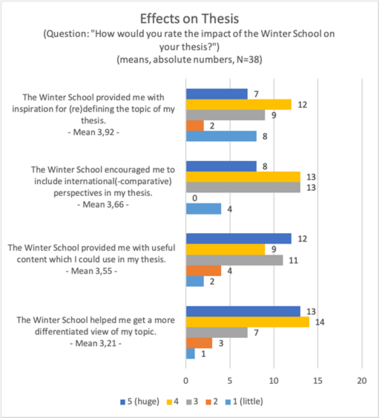 Figure 2: Effects on Thesis
Figure 2: Effects on Thesis
(2) Regarding its work-related aims, the Winter School indeed also strengthened the participants’ motivation to work in international work contexts. At this, the data of 17 persons “currently working” and 18 persons “currently not working” was available. In both groups the majority again highly agreed that the Winter School had strengthened their motivation to work in international work contexts (83,4% / 76,4%, ratings 4 or 5). 38,9% of the participants currently working felt that the Winter School had provided them with useful information for finding their employment. 64,7% of the former participants not working at the time of the survey strongly agreed to that question.
(3) A remarkable number of participants felt that the Winter School had fostered their competencies needed in work contexts including international aspects of one kind or another. These regarded all competencies suggested in the questionnaire including intercultural competencies, knowledge and understanding of adult education and lifelong learning in other countries, English language competencies and to a slightly lower degree analytical and methodological competencies. The chart below illustrates the details.
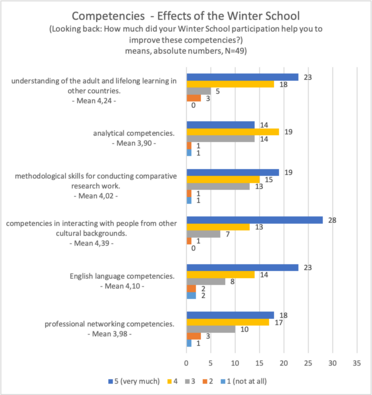 Figure 3: Competencies - Effects of the Winter School
Figure 3: Competencies - Effects of the Winter School
(4) And finally, the mid-term survey again confirmed that the Winter School successfully provides a (growing) professional network to its participants and induced close exchanges and cooperation among its participants. 75,6% of the respondents felt to be part of a network they could contact whenever needed (ratings 4 or 5). Around half of the group (51%) agreed to have established very close exchange or cooperation with other participants. The use of the LinkedIn-networks related to the Winter School seems to be rather individual. 28,6% of the respondents stated they used these networks in an active way (posting news, participating in discussions), 34,6% follow the news and discussions but contribute only occasionally.
Mid-term Evaluation 2019 -Summary
Author: Katrin Riß
INTALL-Project Coordinator: Julius-Maximilian University Würzburg, Prof. Dr. Regina Egetenmeyer
Approach
The mid-term survey 2019 was conducted as an online survey. The questionnaire (based on the instrument implemented during the mid-term survey of the predecessor programme COMPALL) was sent to the former participants of the Winter Schools 2014, 2015, 2016, 2017 and 2018 by the organisers themselves and thus was addressed to a total of 331 persons. 71 respondents fully completed the questionnaire and the survey achieved a response rate of 21,5%.
Sample/group characteristics
The Winter School addresses students of the INTALL partner universities and organisations as well as students from cooperating partners and thus addressed a variety of nationalities and countries. These include a number of non-European countries where some of the students of the partner universities originate from. In the mid-term survey 2019, the number of countries where the respondents have or will earn their degrees (master, PhD or both) amount to a total of 21. Regarding the master’s degrees a little less than half of them were achieved in European countries (47,9%). Among the PhD degrees (already earned or still to be earned) 57,6% were located at European universities.
Question: In which country did (or will) you earn your degree(s)? | ||||
master’s degree | PhD degree | |||
| Quantity | Percentage | Quantity | Percentage |
Austria | 1 | 1,4% |
|
|
Brazil | 1 | 1,4% |
|
|
Canada | 1 | 1,4% | 2 | 2,8% |
Denmark | 1 | 1,4% |
|
|
Egypt | 1 | 1,4% | 1 | 1,4% |
Germany | 7 | 9,9% | 6 | 8,5% |
Greece | 2 | 2,8% |
|
|
Hungary | 3 | 4,2% | 1 | 1,4% |
India | 12 | 16,9% | 5 | 7% |
Italy | 5 | 7% | 5 | 7% |
Macedonia | 1 | 1,4% |
|
|
Malaysia | 1 | 1,4% |
|
|
Nigeria | 5 | 7% | 3 | 4,2% |
Portugal | 7 | 9,9% | 3 | 4,2% |
Romania | 1 | 1,4% |
|
|
Serbia | 1 | 1,4% | 1 | 1,4% |
Slovenia | 2 | 2,8% | 1 | 1,4% |
Turkey | 1 | 1,4% | 1 | 1,4% |
UK | 2 | 2,8% | 1 | 1,4% |
USA | 2 | 2,8% | 1 | 1,4% |
France |
|
| 1 | 1,4% |
international (binational doctoral programme) |
|
| 1 | 1,4% |
Total | 57 | 80,3% | 33 | 46,5% |
No mention | 14 | 19,7% | 38 | 53,5% |
Table: Countries where Respondents did (or will) earn their Degree(s)
With regard to the respondents’ study status at the time of the survey approximately three out of four respondents were still studying or intended to continue their master studies with PhD studies (53 respondents, 74,6%, green background in the pie chart). 15 respondents (21,2%) on the other hand had finished their studies already (blue background in the pie chart). 14 respondents were already employed at the time of the survey.
Figure: Study Status
Results
Like in the years before during the COMPALL evaluation[1] the mid-term survey shows that – apart from being a very memorable and valued event – there are verifiable effects the Winter School has on its participants’ further study and work careers.
Firstly, regarding their further studies the great majority of the respondents felt quite encouraged to take up next steps of studies (PhD). Also, the Winter School obviously succeeded in its intention to motivate and encourage students to deal with international or comparative perspectives in their studies respectively their theses.
Figure: Effects on Thesis
Secondly, the respondents confirm considerable effects on their qualification profile. All competencies the questionnaire referred to – including intercultural competencies, network competencies, methodological competencies for comparative research, language competencies, analytical competencies and knowledge on adult education and lifelong learning in other countries – achieved very high ratings.
Figure: Competencies - Effects of the Winter School
Thirdly, the survey shows that the Winter School indeed works as a platform that establishes lasting professional and personal contacts and networks among its participants. Even if the respective ratings turn out to be a little lower compared to other findings, the very big majority felt to be part of an international network they can use according to their needs.
And fourthly, according to the large majority the Winter School has a noticeable influence on the respondents’ interest and motivation to work in international contexts or on international issues. At the time of the survey about two third of the respondents being employed dealt with international aspects in their work (considering that the total number of respondents at the time was rather low). Nevertheless, the fact that the very big majority of the respondents not yet employed also hoped to deal with international aspects in their work one day supports the finding that the international dimension continues to be a relevant factor to the students. Further, a considerable number of the respondents felt that the Winter School was able to enhance their (future) chances on the labour market. Almost two third felt it could have enhanced their chances for an academic career.
Figure: Effects regarding Work Issues (Respondents currently not working)
Finally, the open-ended answers also support the impression that the Winter School seems to be able to offer an effective mix of knowledge transfer, training opportunities for several research, professional and personal competencies and also chances of networking. Summarizing all these facts, one can state that – according to the participants – the Winter School provides an effective learning setting which offers significant inspirations regarding the respondents’ vision of their own development and career and also regarding their competence profile.
An aspect interesting to follow in the further evaluations might be the question whether there are any differences between the students coming from different countries of study. However, the limited number of cases does not allow such analysis at the moment. Also, a closer look on the group of practitioners, who were included in 2019 for the first time, might be of interest in the mid-term surveys scheduled for 2020 and 2021. This will depend on the number participants and thus potential respondents in the Winter Schools to come.
[1] As mentioned before the Winter School of the predecessor programme COMPALL also was monitored by an extern evaluation. In the years 2017 and 2018 a mid-term survey kept track of the effects of the programme.
COMPALL (2015-2018) evaluation
You here can find the results of the evaluation of the ERASMUS+ strategic partnership COMPALL (2015-2018).
Evaluation on the impact of the joint module – outcomes of the Winter School
For assessing the development of the joint module and for measuring the impact of the intensive programme, the Strategic Partnership has implemented a formative evaluation, both qualitative and quantitative that accompanied the whole development process and critically reflected the implementation of all intellectual outputs – within and beyond the learning activities. The evaluation is divided in an external evaluation and an internal evaluation. The external evaluation was conducted by Susanne Lattke of the DIE (German Institute of Adult Education). The evaluation design and interpretation was developed in collaboration with the COMPALL Project Coordinator, Prof. Dr. Regina Egetenmeyer (Julius-Maximilians-University of Würzburg). All citations on this webpage are part of the internal evaluation reports. The evaluation design involved both short and mid-term evaluations of the Winter Schools defining indicators at the participant and the organizational level.
For the short-term evaluation, participants were requested to fill in a paper questionnaire at the final session of each Winter School. The questionnaires of each year were rather identical with adopted questions on specific components. In addition, a number of interviews were conducted with selected participants during the last days of the Winter School. Information from project documents (e.g. COMPALL application, International Winter School brochure) and information orally provided by the organisers (e.g. regarding total participant numbers) have complemented the data, which was obtained through the surveys and interviews.
For the mid-term evaluation, participants of former Winter Schools were requested to fill in an online-survey after more than one year of their participation in the Winter School. Within the COMPALL project two mid-term surveys will be carried out. A first survey was conducted in spring 2017. It addressed all participants from the Winter School 2016 and, in addition, all participants of the previous pilot editions of the years 2014 and 2015, which took place before the COMPALL project. A second midterm survey is taking place in spring 2018 targeting all cohorts of the programme.
Both evaluation methods form the comprehensive picture on the impact of the implemented intensive programme focusing on the following targets:
“The main focus of the short-term evaluations, in a formative perspective, is on participant satisfaction and on the quality of the Winter School and its related offers. Also, the short-term evaluations focus on the academic and personal outcomes and benefits which the participants have gained from the Winter School, mainly in terms of learning outcomes and increased motivation for international activity.” (Midterm-Term Evaluation Report 2017, p.5)
“The mid-term surveys, by contrast, focus primarily the development of former participants’ professional careers and/or further studies, and the impact which the Winter School has had on these.” (cf. ibid.)
The structure of the external evaluation followed a six-step process:
· Step 1: Ascertainment of the evaluation concept for the three year, development of indicators into questionnaire items
· Step 2: Student questionnaire used for the first cohort after the first intensive phase
· Step 3: Student questionnaire used for the second cohort after the second intensive phase
· Step 4: Mid-term student questionnaire used for asking the first cohort for longer-term effects
· Step 5: Student questionnaire used for the third cohort after the third intensive phase
· Step 6: Mid-term student questionnaire used for asking all cohorts for longer-term effects.
In addition to the external evaluation, the Strategic Partnership conducted an online survey on the developed online tutorials piloted in the intensive programmes 2017 and 2018. A short summary of the results is provided in the corresponding Abstracts.
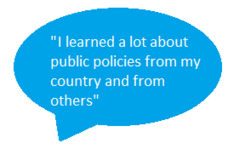 | 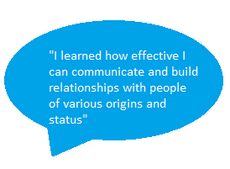 |  | 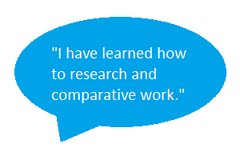 |
|---|
Mid-Term Evaluation 2018
Extraction of the external evaluation results,
which was conducted by German Institute for Adult Education, Susanne Lattke
COMPALL-Project Coordinator: Julius-Maximilian University Würzburg, Prof. Dr. Regina Egetenmeyer
Participation in the Mid-Term Survey
The midterm survey 2018 was implemented as an online survey. All students who had participated in the Winter Schools in the years 2014-2017 (n=279) received an invitation to fill in the questionnaire which they could easily access through a link which was provided together with the invitation. The years 2014-2015, which do not belong to the ERASMUS+ COMPALL-project where included to ensure a broader database and to raise the value of the data for the analysis of the impact of the COMPALL-project. For data privacy reasons, the invitation was sent by the organisers of the Winter School and not by the evaluator (the author of this report). The questionnaire opened between 24 April and 29 May 2018. Three reminders were sent within this period to reach as many former participants as possible. Ultimately, the questionnaire was fully completed by 68 respondents, which corresponds to a response rate of 24.4%.
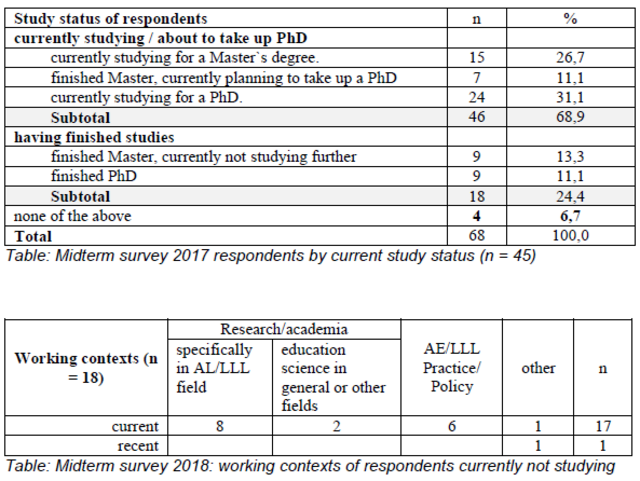
Labour Market
The midterm survey 2018 shows that a high proportion (three quarters) of respondents currently working are actually facing international aspects in their work, and a similar proportion of those
currently not working are highly motivated to engage with international issues in their future activity. Respondents not only find an international dimension in their future work highly attractive but also consider this perspective as rather realistic for themselves. Even cross-border mobility for finding employment in another country is considered a likely option by a considerable share of the respondents, in the 2018 survey even much more (mean 4.02) than in 2017 (mean 3.48). Regarding the Winter School’s impact, respondents confirm in particular that the Winter School has strengthened their motivation for international work, but also that it has contributed to developing competencies which are considered as useful in view of labour market and career perspectives. Considerable shares of respondents, both currently working and currently still studying, are also convinced that the Winter School participation has enhanced their competitive advantage on the labour market and, in particular, within the scientific community, in case they aim for a career in that context.
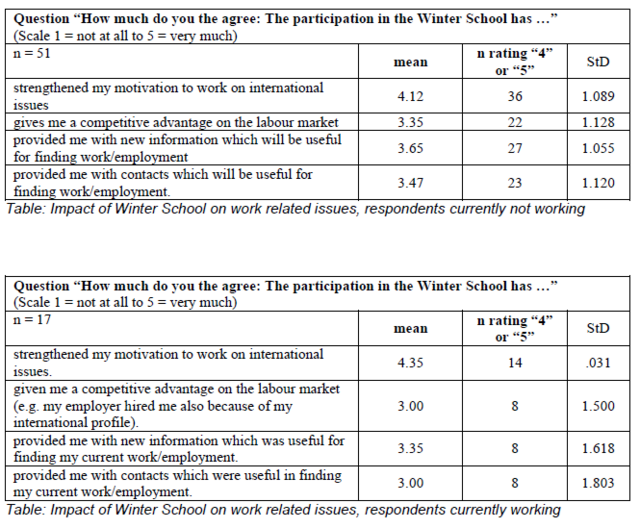
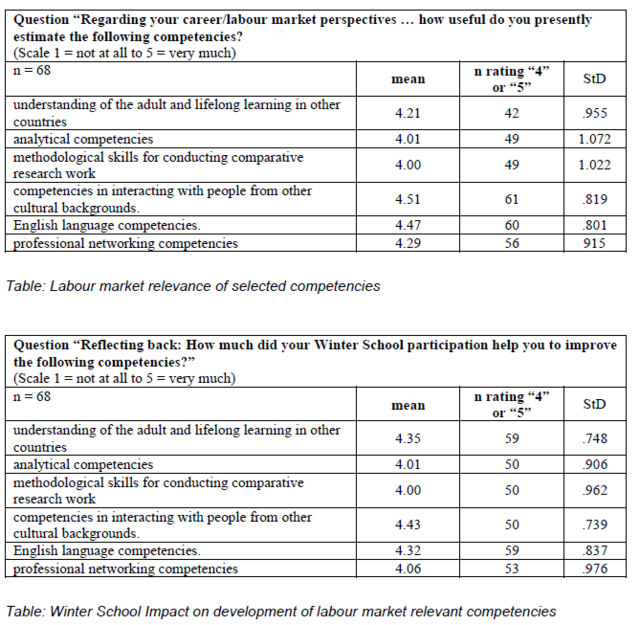
Networking Impact
About two thirds of the participants have started close collaborations with other participants after the Winter School and almost all respondents have the feeling of being part in an international network which may prove useful to them in case of need. These findings were consistent in both midterm surveys, 2017 and 2018. The finding from the midterm survey 2017, that about 25% of the respondents were still rather active users of the LinkedIn-networks was also repeated in 2018. The number of passive users was with about 60% of the respondents clearly higher. The online linkedIn networks thus seem not to be the most important tool for keeping in touch, but still they offer an additional resource which is used at least passively by a considerable share of the participants.
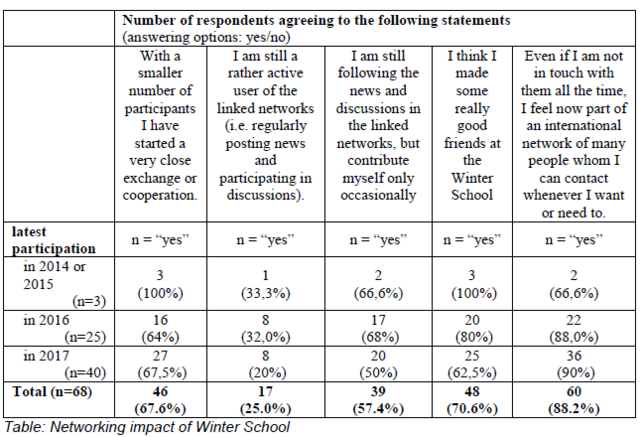
Impact on PhD Study
Another aim of the Winter Schools is to increase the number of highly qualified graduates in the field of adult education in general, and in view of an international study profile in this field in particular. As in 2017 and to an even higher extent, the midterm survey results 2018 show that the Winter School has strengthened in many respondents the motivation to take up a PhD study. Those respondents who have already started their PhD research also believe that the Winter School has contributed to the methodological and analytical quality of that Research.
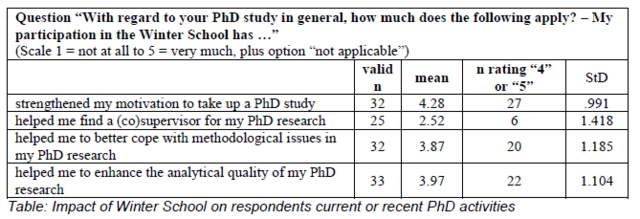
Impact on International Dimension of Study
The majority of respondents had actually included international perspectives in their Master or PhD thesis or were intending to do so. Respondents also stated that the Winter School had had an impact on their thesis. Especially respondents who, at the time of answering the survey, were currently studying for a PhD or who had just finished their Master studies and were planning to take up a study rated this impact as rather high. The same pattern could already be observed in the midterm 2017 survey, with even higher impact rates at that time. It seems likely that these particular groups have participated in the Winter School during a “crucial” phase in their studies; a phase, in which many issues regarding a possible follow up PhD research may not have been firmly fixed but had still to be decided and shaped, so that the Winter School could come in as an influential experience.

Personal and Professional Outcomes
Looking back from a distance, most participants had very positive views regarding their individual outcomes from the Winter School. Mmore than three quarters of the respondents agreed that the Winter School had considerably helped them in both their professional and personal development, and respondents were nearly unanimous in saying that the Winter School had been an enjoyable experience.

Participant Quotes from open Questions:
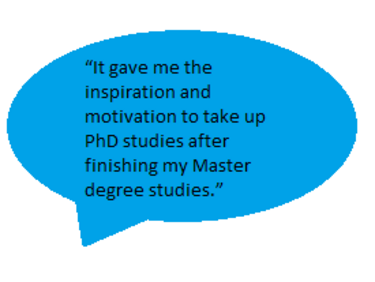 | 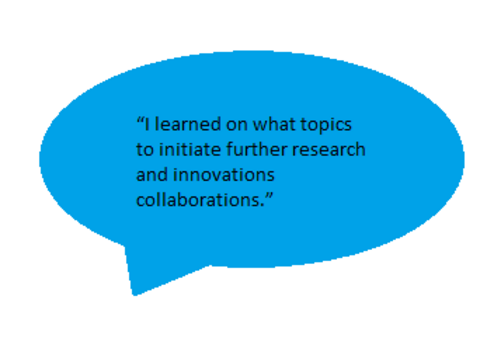 |
|---|
Evaluation of Winter School 2018
Extraction of the external evaluation results,
which was conducted by German Institute for Adult Education, Susanne Lattke
COMPALL-Project Coordinator: Julius-Maximilian University Würzburg, Prof. Dr. Regina Egetenmeyer
Participation in the 2018 Evaluation
The Winter School 2018 evaluation is based on the paper questionnaire which was distributed by the working group leaders to all participants on the final day of the Winter School. The International Winter School 2018 was attended by a total of 61 participants. The number of filled questionnaires amounted to 59, so that the response rate is 96.7%. About two thirds of the participants (42) were Master students and one third (19) were PhD students. The sample of respondents reflects the same 2:1-relation between MA and PhD students (31 Master vs. 14 PhD). 14 respondents chose not to indicate their study level in the questionnaire.
Participants’ Satisfaction
The Winter School in 2016 had set out already on a very high level, as far as both participant satisfaction and perceived benefits/impact of the Winter School are concerned. The Winter Schools in 2017 and 2018 not only have maintained these level but managed to achieve even further improvements in the participant ratings over the three years. The overall assessment shows that the participants’ general satisfaction with the International Winter School was very high. The mean value was 4.42 (n=48) which means an improvement compared to the already very high values of the two previous years (4.20 and 4.24 respectively).

Again, participants’ satisfaction turned out to be very high for all aspects with each single mean value being above 4.0. This, too, means a further improvement compared to the previous year(s), although values had been rather high already in 2016 and 2017. In particular, satisfaction with the preparatory phase has increased compared to 2017. This show that the new preparatory offers (video tutorials, online information tools) which have been developed by the organisers since the last year, are well accepted by the participants. Complaints from the first year regarding the academic content of the Winter School or the composition of the participants group (uneven skills levels, e.g. regarding English proficiency, or unbalanced geographical distribution) have greatly diminished over the years. This suggests that the organisers have been successful in establishing an effective recruiting policy which ensures that potential participants are well informed about what they have to expect from the Winter School and what is required from them for a successful participation. At the same time, the geographical distribution of participants’ countries of origin became more balanced over the years: the numerical dominance of a few countries was reduced and it became easier to compose the working groups within the Winter Schools in a way to include a broad range of different country perspectives.
Participants’ Competence Development
In the later years 2017 and 2018, the focus on academic and professional content has become clearer, whereas in 2016 participant feedback had still focused very prominently on intercultural and social outcomes, including networking opportunities. These intercultural and social aspects remained important also in 2017 and 2018, however they were no longer the dominating feature in the participant feedback. Rather, the Winter School increasingly appears as a learning offer which combines in an integral way specific subject-related competence development with the development of transversal competences and personal soft skills, besides offering a highly enjoyable experience and an excellent opportunity for building up personal and professional networks.
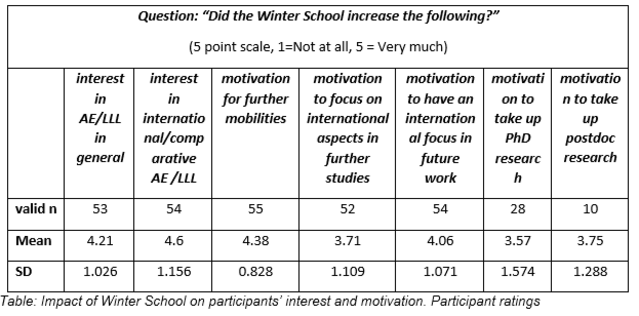
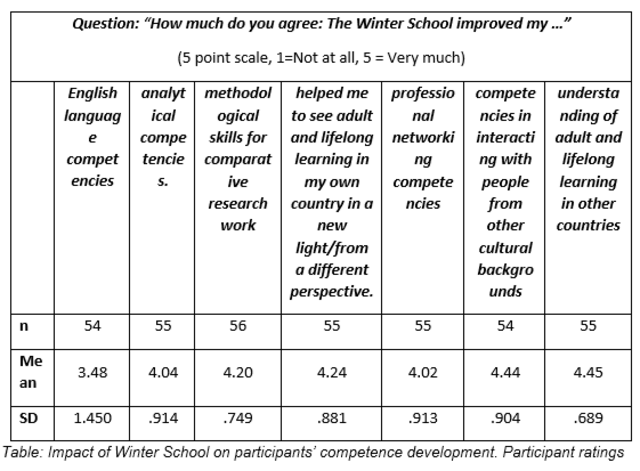
Impact Career on Career Chances
The career relevance of the Winter School (outcomes) have been unchangeably rated positively by the participants in all years, which suggests that the Winter School concept reflects well the competence needs in both an academic context and the labour market.
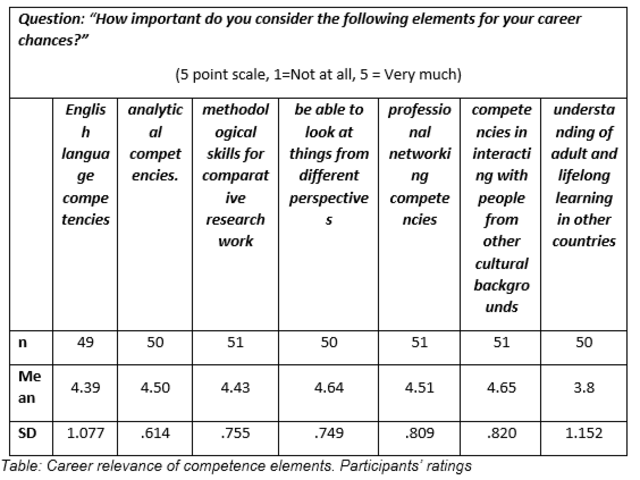
Summary of external evaluation
One can conclude that the overall concept of the Winter School seems highly sustainable and does not need to be changed in a substantial way. There will be a need to secure the necessary financial means for the running of the Winter School after the Erasmus project funding has ended. Since the Winter School can rely on a solid consortium of partners and since during the project’s lifetime a substantial basis of materials was built up which can be used also in the future, there are good prospects for the Winter School to become a sustainable offer in the long-term. An appropriate information policy to reach and support (prospective) participants seems essential for the future success of the Winter School. A substantial part of the critical remarks made by participants in all years can be attributed to wrong expectations on the side of the participants or to a (felt) lack of orientation or preparation. The Winter School organisers are aware of this issue and have already developed with some success their information and support offers over the years. Also in the future, this issue of information and preparation of the participants should receive particular attention, as its impact on the Winter School success and the satisfaction on the participants seems considerable. The preparation phase underwent substantial developments over the three years, with many new materials (videos, tutorials, guidelines) being developed to support participants in their own work prior to the intensive phase in Würzburg. These materials are clearly appreciated and found helpful by the participants. They, too, should be kept as a regular feature and be updated as needed. By way of a concluding overall appreciation, it can be stated that the International Winter School obviously provides a very attractive and highly effective opportunity to students from (potentially) all over the world to learn and develop as an individual and as a (future) professional in the field of adult education in an increasingly globalized context. Moreover, the Winter School has shown its ability to develop and improve further over the years so as to satisfy participants’ needs and expectations to an ever higher degree.
Evaluation 2017/2018
How do you asses the online-tutorials all together?
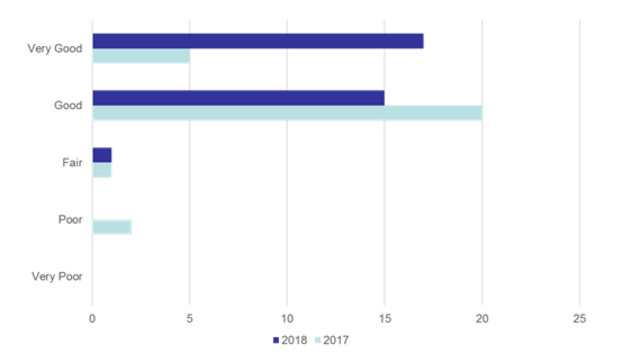
How helpful do you estimate the online-tutorials for your preparation to the Winter School?
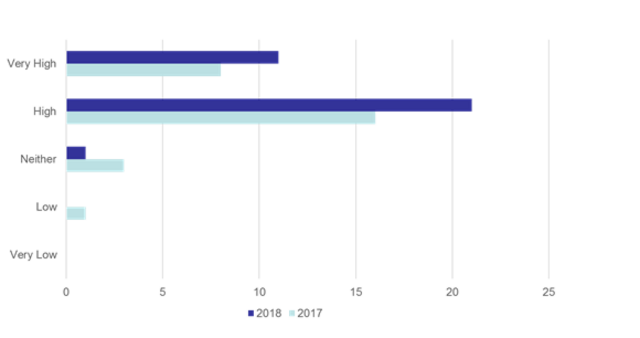
Mid-Term Evaluation 2017
Extraction of the external evaluation results,
which was conducted by German Institute for Adult Education, Susanne Lattke
COMPALL-Project Coordinator: Julius-Maximilian University Würzburg, Prof. Dr. Regina Egetenmeyer
Participation in the Mid-Term Survey
The midterm survey 2017 was implemented as an online survey. All students who had participated in the Winter Schools in the years 2014-2016 (n=189) received an invitation to fill in the questionnaire which they could easily access through a link which was provided together with the invitation. The years 2014-2015, which do not belong to the ERASMUS+ COMPALL-project where included to ensure a broader database and to raise the value of the data for the analysis of the impact of the COMPALL-project. For data privacy reasons the invitation was sent by the organisers of the Winter School and not by the evaluator (the author of this report). The questionnaire was open between 25 April and 21 May. Three reminders were sent within this period to reach as many former participants as possible. Ultimately, the questionnaire was fully completed by 65 respondents which corresponds to a response rate of 34,4%.
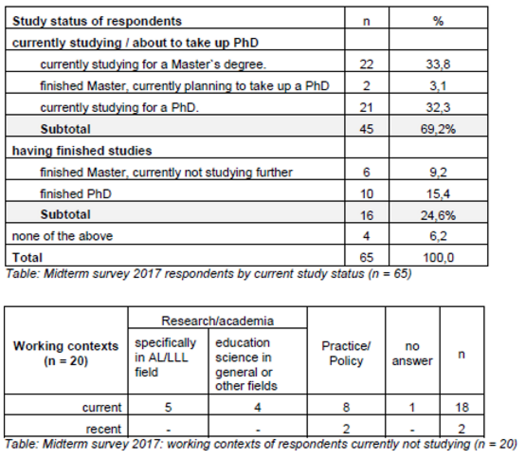
Labour Market
Regarding work related issues, the Winter School had a particularly high impact on increasing participants’ motivation to work on international issues. This was especially true for respondents who were not (yet) working (mean 4.13 on a five-point-scale). About half of the respondents not (yet) working considered that the Winter School had notably (rating ‘4’ or ‘5’) contributed to their employment perspectives, by giving them a competitive advantage on the labour market and by providing them with information or contacts which would be useful in finding employment (ibid.). The proportion of respondents currently working who were of the same opinion with regard to their current employment was only slightly lower. It ranged between one third and almost one half of the respondent for the different items.
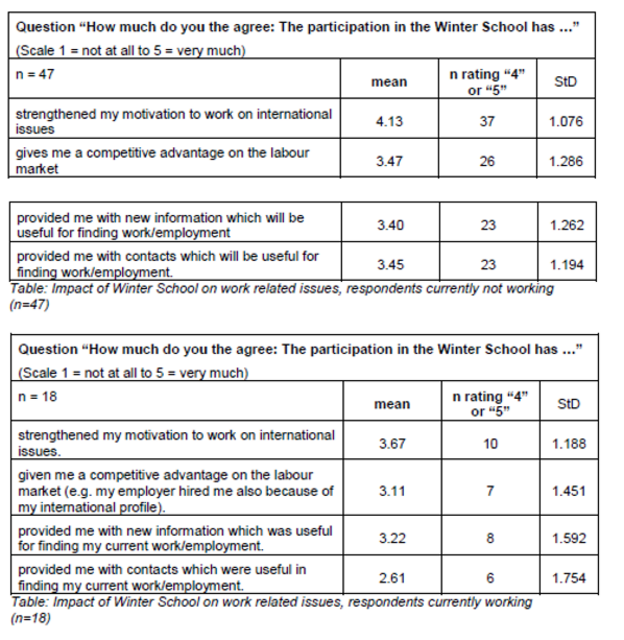
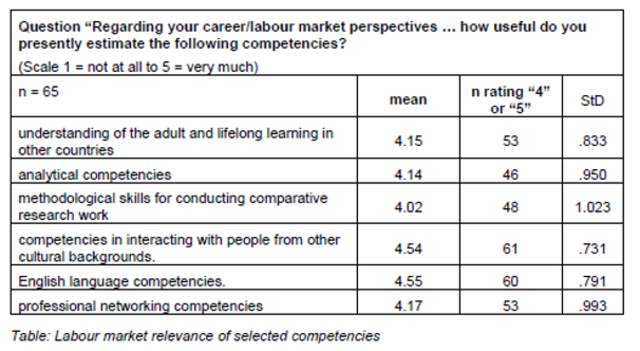
Networking Impact
Two thirds of the respondents stated that they had started a close exchange or cooperation with some fellow participants, and 75% of the respondents felt they had made some really good friends at the Winter School. The linkedIn networks seem to play only a subsidiary role in that. Only about one quarter of the participants stated that they were very using these networks very actively. About two thirds were at least following the news in the networks more passively. This reduced active use of the network seems however not to compromise the Winter School’s impact as such. As many as 86% of the respondents stated that they were feeling part of an international network of people whom they can contact at any time if need be, no matter if they were permanently in touch with them or not.
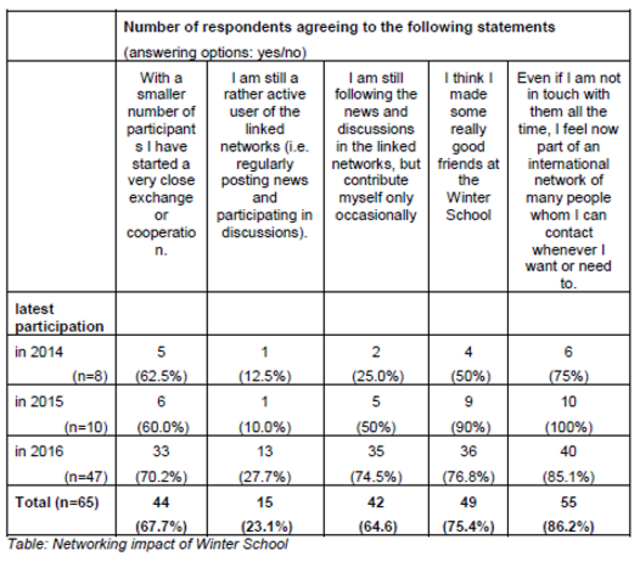
Impact on PhD Study
About half of the respondents who were currently preparing or studying for a PhD or who had already finished their PhD agreed to a high extent with the statements that the Winter School participation had strengthened their motivation to take up a PhD, that it had contributed to its analytical quality and that it had helped them to better cope with methodological research issues. Furthermore, at least two respondent have obviously found their (co)supervisor for their PhD research through the Winter School. Of those respondents who were not (yet) actively dealing with PhD studies (n=32), 24 stated that it was somehow likely that they would take up a PhD research in the future.
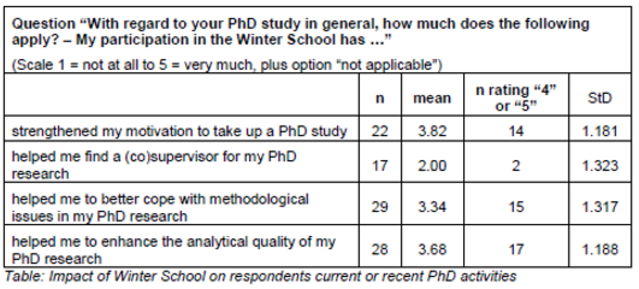
Impact on International Dimension of Study
Again, about half of these respondents confirmed that the Winter School had considerably strengthened their motivation for taking up a PhD and that the Winter School had also provided them with ideas for a possible topic. As many as nine respondents agreed that the Winter School had a role in helping them to find a prospective (co)supervisor for their thesis.
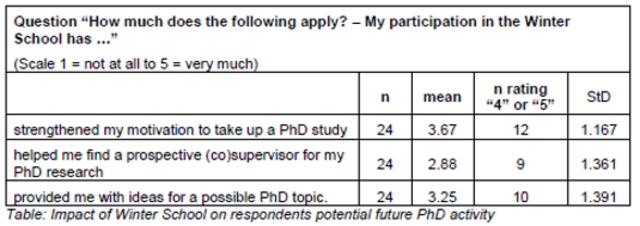
Personal and Professional Outcomes
Looking back from a distance, most participants had very positive views regarding their individual outcomes from the Winter School. When asked to rate different outcomes on a five-point scale, about 80% of the respondents agreed by rating “4” or “5” that the Winter School had considerably helped them in both their personal and professional development, and respondents were nearly unanimous in saying that the Winter School had been an enjoyable experience. Regarding improved career chances, about half of the respondents rated the Winter School’s impact “4” or “5”: 45% of the respondents saw a good impact on their labour market chances in general, and almost 60% said the same with respect to a career in the scientific community, in particular.
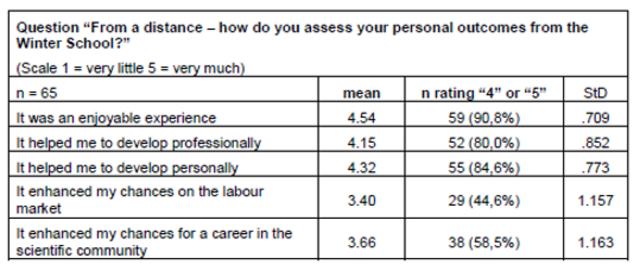
Evaluation of Winter School 2017
Extraction of the external evaluation results,
which was conducted by German Institute for Adult Education, Susanne Lattke
COMPALL- Project Coordinator: Julius-Maximilian University Würzburg, Prof. Dr. Regina Egetenmeyer
Participation in the 2017 Evaluation
The Winter School Evaluation 2017 is based on the paper questionnaire which was distributed by the working group leaders to all participants on the final day of Winter School.
The number of filled questionnaires also amounted to 84, so that the response rate would be 100%. Master students were with 50 respondents the biggest group compared to 32 PhD students. Two respondents chose not to indicate their study level in the questionnaire. (Master students: 59, 5 %, PhD students: 38, 1, other/no answer: 2,4%).
Participants‘ Satisfaction
The overall assessment shows that the participants’ general satisfaction with the International Winter School was very high. The mean value was 4.24 which is almost exactly the same as in 2016 (4.20).

Again, participants‘ satisfaction turned out to be very high for all aspects with means ranging between 3.8 and 4.15 for almost all aspects. There were only a few comments given in the questionnaire regarding the preparatory phase. Nevertheless, one should note, that especially the preparatory phase is still under development and new features, such as online tutorials, were newly introduced and piloted fort the first time in 2017.
Participants‘ Competence Developement
The ratings are very similar to 2016. In a general perspective, participants judged their academic and personal outcomes from the International Winter School very positively. Regarding specific competences, respondents clearly feel that the International Winter School has considerably contributed to their competence development in many different regards, including both “soft” skills” like intercultural competence and “hard” academic skills like methodological research skills.
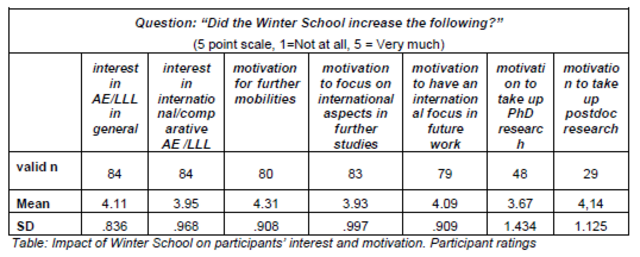
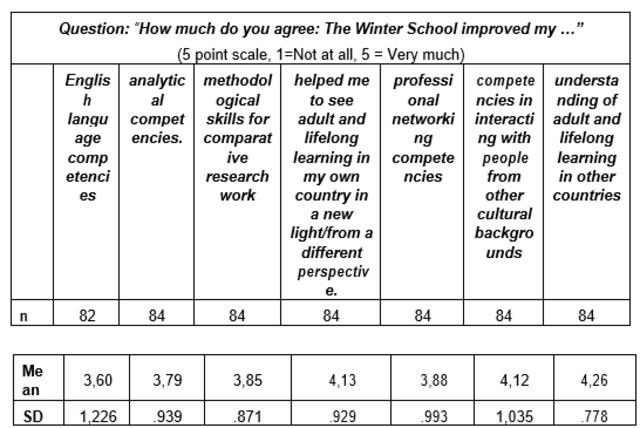
Impact Career on Career Chances
The career relevance of the Winter School have been rated very high. It shows that the competences which the International Winter School addresses are considered by the participants as highly relevant for their career chances.
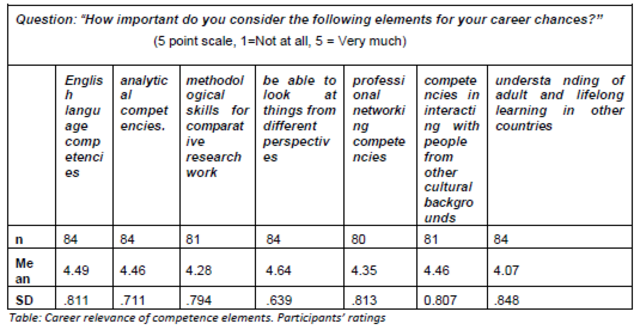
Summary of external evaluation
As in 2016, the findings from the Winter School evaluation provide a very positive overall picture. Regarding the perspectives for the future development of the International Winter School, one can conclude that the overall concept of the Winter School seems highly sustainable and should not be changed in a substantial way. By way of a concluding overall appreciation, it can be stated that the International Winter School obviously provides a very attractive and highly effective opportunity to students from (potentially) all over the world to learn and develop as an individual and as a (future) professional in the field of adult education in an increasingly globalized context. Most participants had already dealt with international topics at least to some extent, but for about one half of the participants this was their first international study mobility. Participants’ motivations for attending the International Winter School were multidimensional but the desire to meet people from other countries and to learn about other countries were particularly stressed. Regarding participant satisfaction and impact, the evaluation shows that the International Winter School has succeeded in maintaining the very high level of the previous year in all respects. The Winter School provides a multifaceted and at the same time coherent learning opportunity which makes a valuable contribution to the participants’ both personal and professional development as adult education researchers or experts.
Evaluation of Winter School 2016
Extraction of the external results,
which was conducted by German Institute for Adult Education, Susanne Lattke
COMPALL-Project Coordinator: Julius-Maximilian University of Würzburg, Prof. Dr. Regina Egetenmeyer
Participation in the 2016 Winter School
The Winter School 2016 was attended by 91 participants from 19 countries. Of these, 82 participants filled in and returned the questionnaire, corresponding to a response rate of approx. 90%. Master students (51 respondents) outnumbered PhD students (23). The proportion of Non-European participants (at least 25) was considerable, but the focus was clearly on participants from European countries (at least 50).
Participants’ Satisfaction
The overall satisfaction with the Winter School was very high. The overall means was 4.20. Participants also appreciated the opportunity to learn about international concepts and about the situation in other countries and to get new ideas and perspectives. Another aspect which was highlighted was the active involvement of students through group discussions, group/team work and self-responsible work of students.
Participants’ Competence Development
The ratings show that respondents feel the Winter School has considerably contributed to their competence development. The lowest – but still high – mean values were obtained by English language competencies” (mean 3.8) and methodological skills for comparative research (3.9). All other items – analytical competencies, being able to see adult education in one’s own country in a new light, professional networking, interacting with people from other cultural backgrounds, and understanding adult education/lifelong learning in other countries - scored above 4. Overall, participants judged their academic and personal outcomes from the Winter School very positively (means of 3.7 for academic and 4.3 for personal outcomes). The overall picture thus shows that respondents feels they have obtained a broad range of learning outcomes with the foci being very much in line with the intended aims of the Winter School.
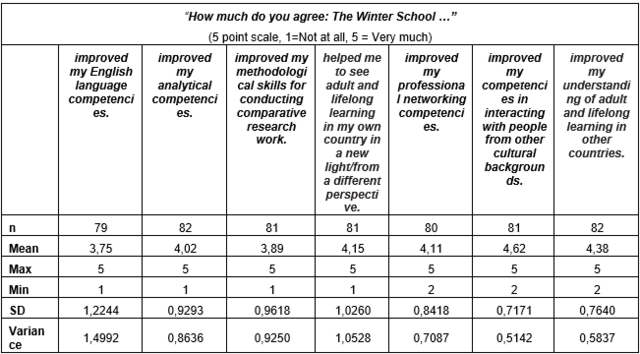
Impact Career on Career Chances
All competencies were attributed a high importance by the respondents with the mean values ranging from 3.93 to 4.74. If one compares, how respondents rated the career relevance of the different competencies addressed by the Winter School on the one hand, and how they assessed the Winter Schools’ contribution to developing exactly these competencies on the other hand (see section 4.2.2) one can conclude that the Winter School made a significant contribution to enhancing the participants’ future career chances.
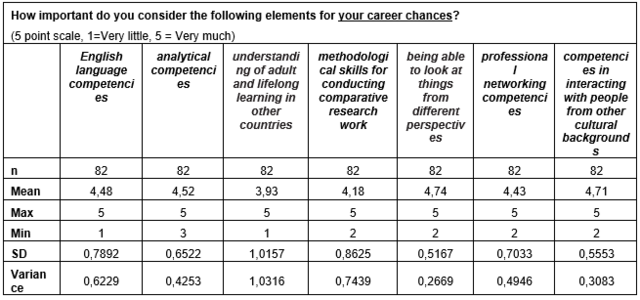
Summary of external Evaluation
The evaluation showed very high satisfaction levels of the participants concerning the Winter School as a whole as well as its single parts. As regards the Winter Schools’ impact, participants felt that the Winter School had considerably contributed to enhancing their competences in many regards. Most notably, increased competence for intercultural interaction was highlighted as outcome, but also the development of other competences, both content-related and transversal ones, was felt to have been promoted by the Winter School. Participants also considered that the competences which were promoted by the Winter School were highly relevant for their further career chances, thus contributing to their employability. After attending the Winter School, participants also felt more motivated to engage with international topics in their studies or future professional activities as well as to undertake further study mobilities.
In conclusion, the evaluation showed that the Winter School reached a high number of its target audience, involving different countries of origin, study levels, motivations and degrees of previous international experience. By all these groups the Winter School was perceived as a high quality event which had much to offer for their own academic/professional as well as personal development.


